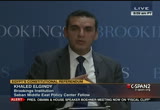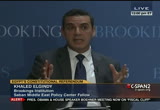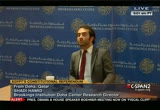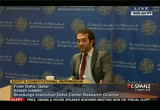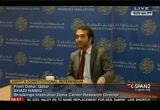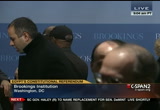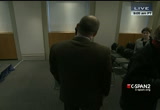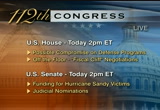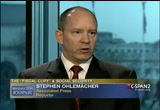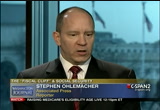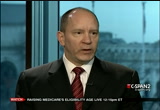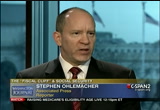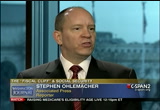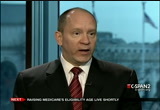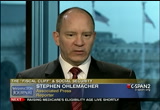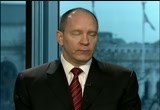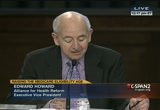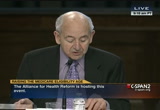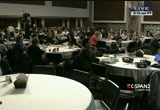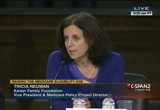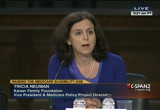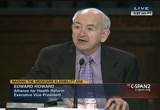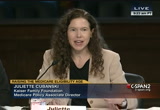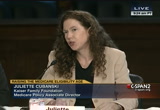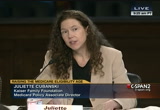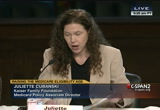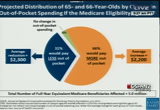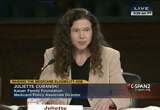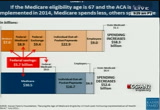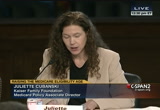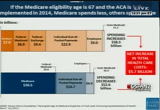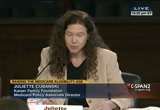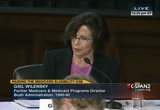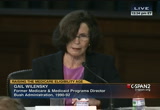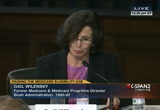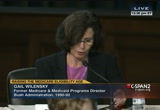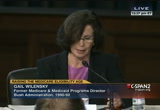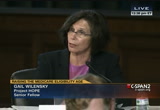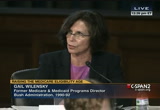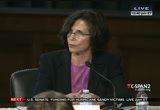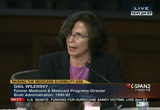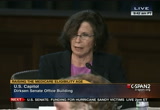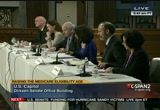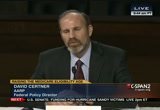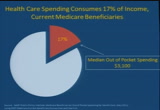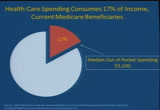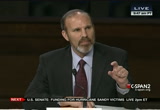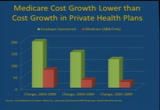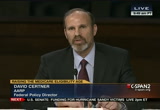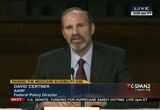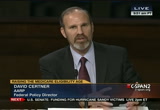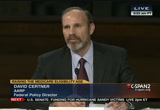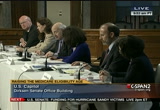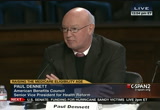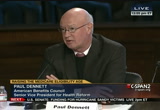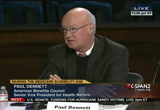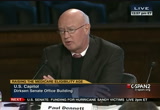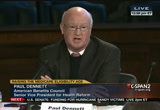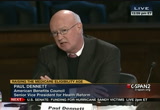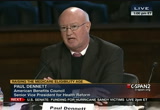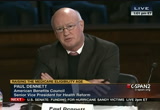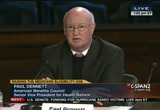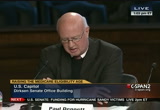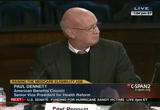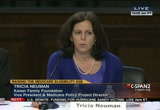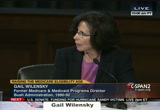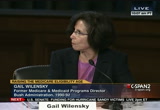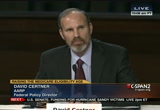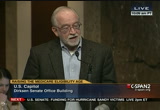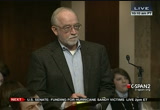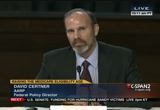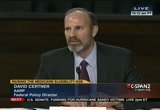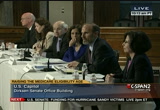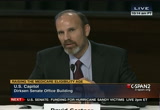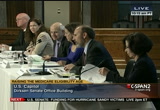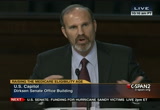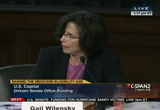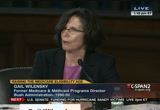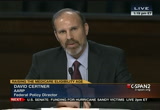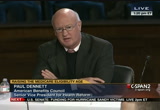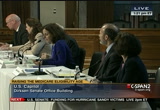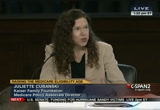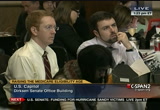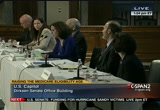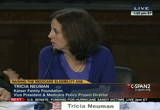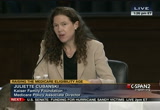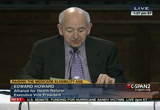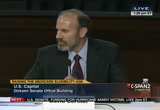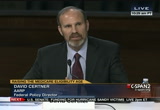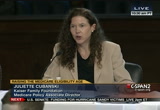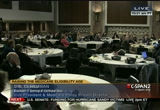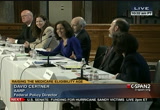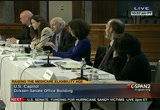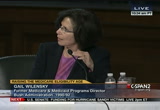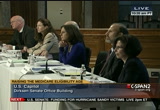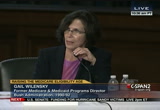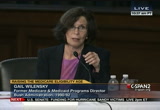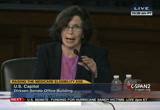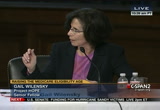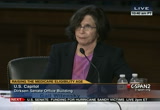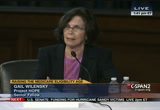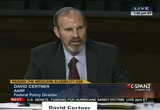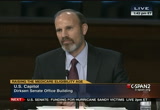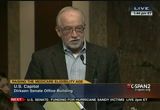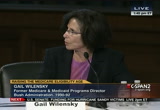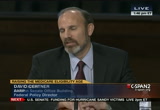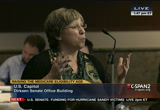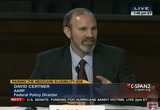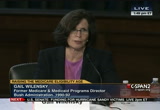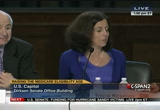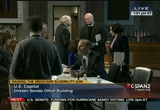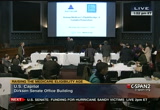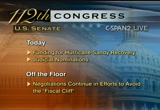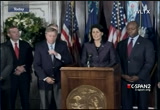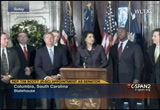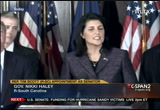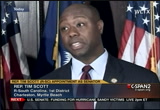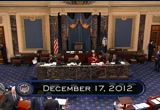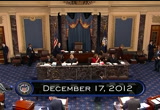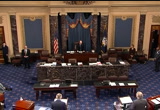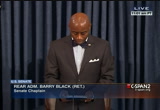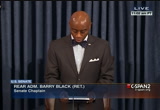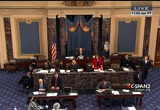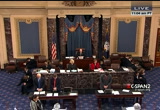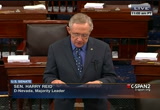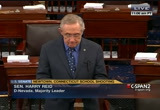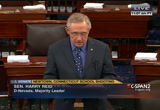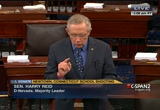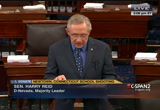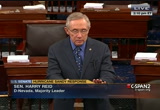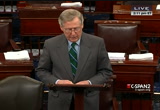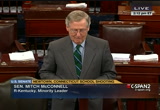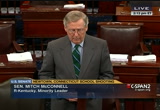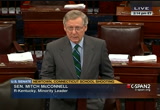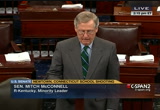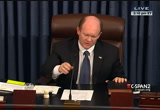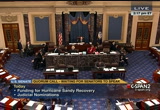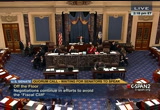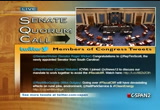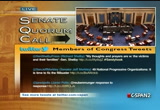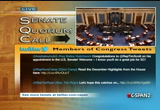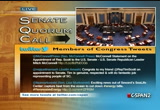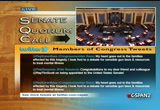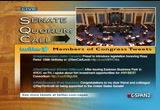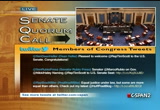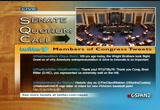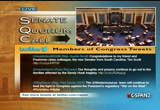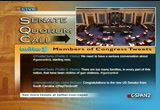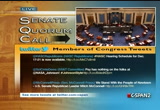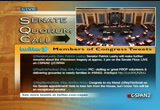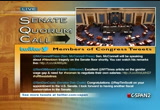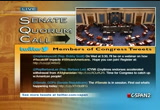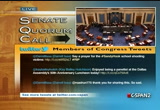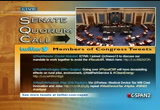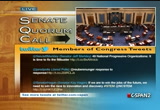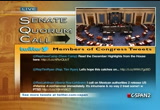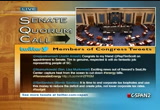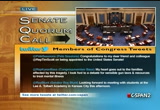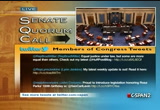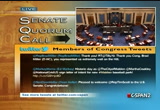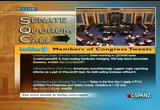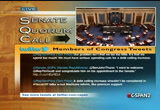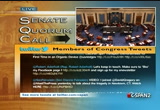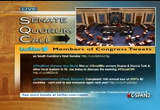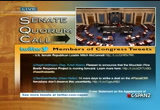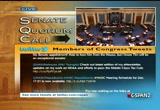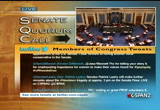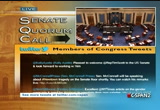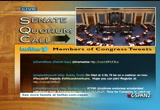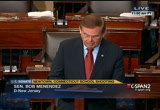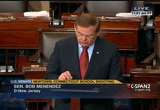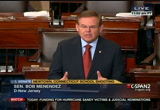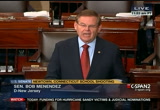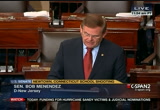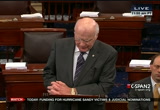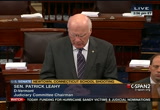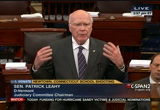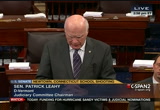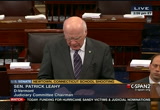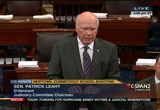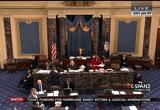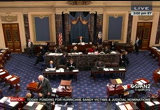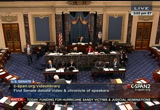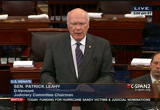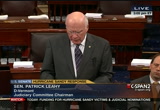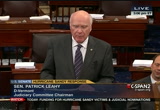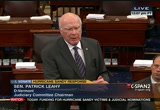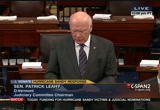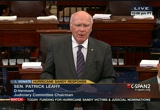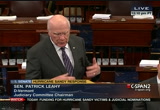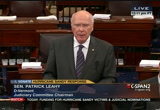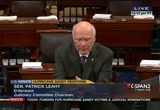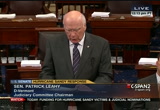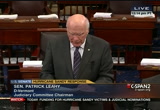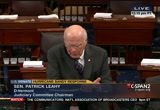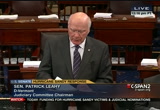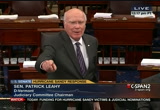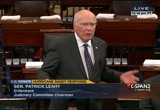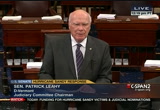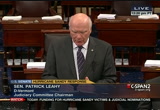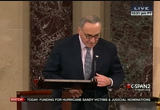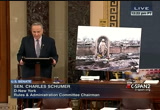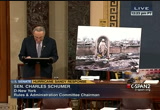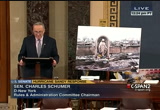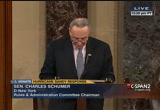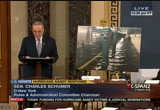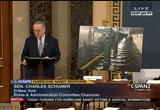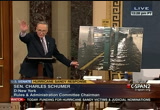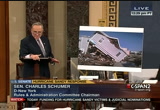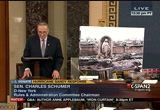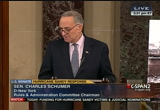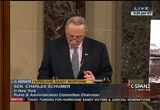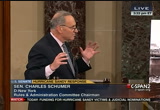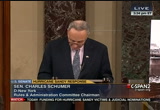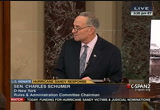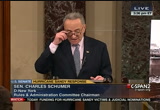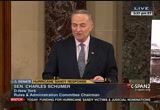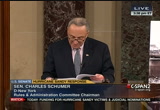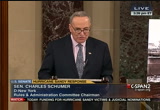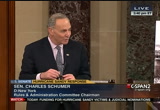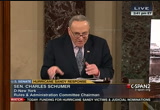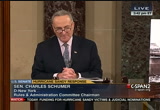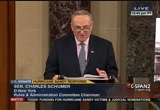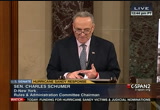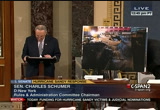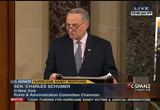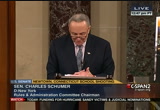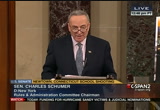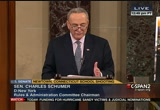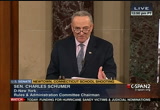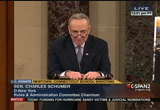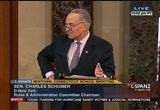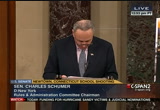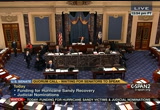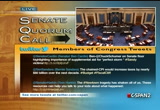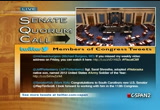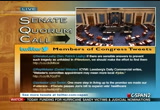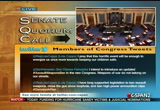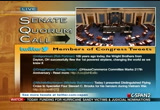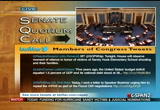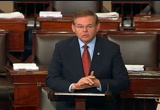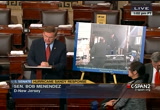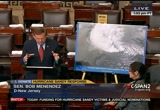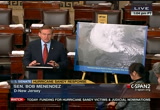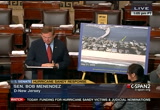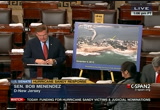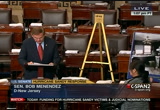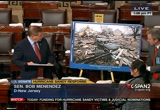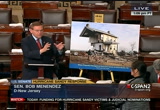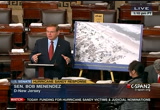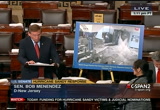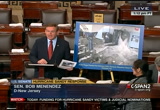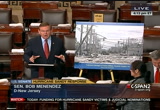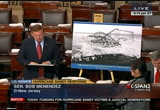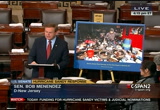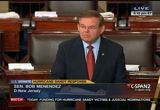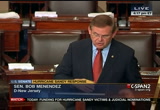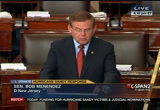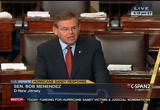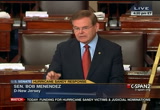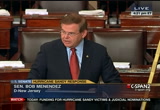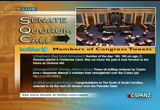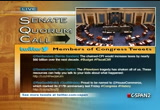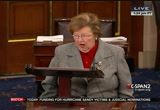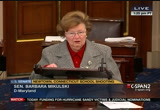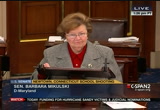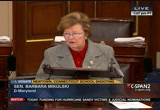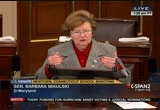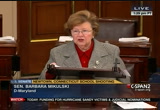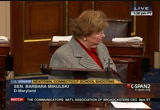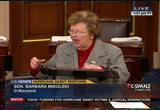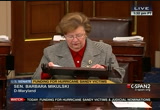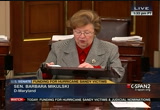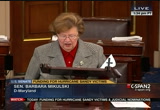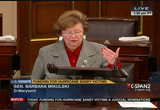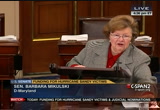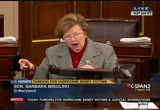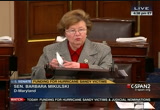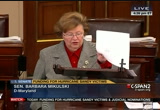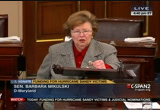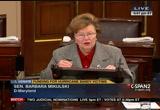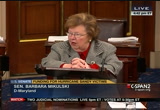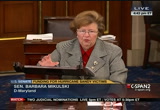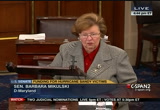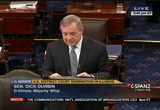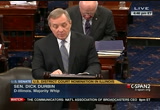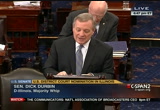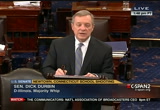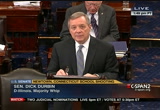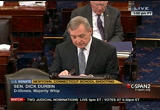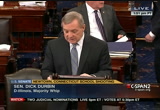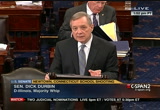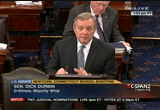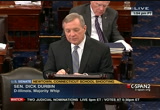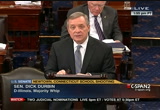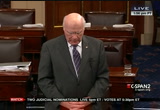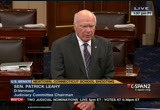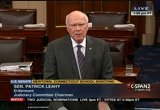tv U.S. Senate CSPAN December 17, 2012 12:00pm-5:00pm EST
12:00 pm
in terms of the rule of law. yes, this is one of the things i think has been seriously eroded first under the staff wrote and that tradition has continued under muslim brotherhood rule, where two very disturbing developments. the one is when the brotherhood members surrounded the cyprian constitutional courts to prevent from convening, in some cases the court justices were threatened. ..
12:01 pm
>> that's obviously a big topic. a couple of names fell on this. nathan brown had an article the title was i think illustrated just because he is paranoid doesn't mean he doesn't have real enemies. so, yes, the brotherhood is very paranoid, but there are certain elements of the deep state premier li the judiciary that four out to really damaged the brotherhood standing in society and there is evidence for that and that is what happened, the disillusionment of power meant and that to me was one of the worst moments and most dangerous of the transition because it fell into the brotherhood of narrative that the world will not let them win an election.
12:02 pm
the memory of algeria shapes everything that they do and we can disagree whether or not these years are legitimate but that is the way they see their world around them. my hope is that if they feel more secure, if some of those threats can be removed and the judiciary, the more independent role than maybe they will be double to get that. i don't know. we will have to wait and see but i think that would be the hope. there are variables that will affect that that we cannot control. with the u.s. does and the international financial institutions do is going to matter. morsi cares about with the international community to cares about him. they are sensitive to that because they need outside support to get their economy back on track so there is a point of leverage. if we can use that i might be
12:03 pm
more optimistic. but in terms of a long-term goal is, it is islam for a reason and they're going to become liberals. all this talk about post islam is unrealistic because we are talking about deeply religious conservative societies where large majorities maybe they don't vote on the basis of sharia but they are sympathetic to public life and they can empower those elements of society to would push them further to the right and that isn't just egypt we see that in other countries where the democracy doesn't always have a moderating effect and they don't have a more islamic egypt and this could be somewhat liberal if not the liberal.
12:04 pm
12:05 pm
12:07 pm
select a freshman congressman tim scott to fill the seat being vacated by senator jim demint. senator demint announced earlier this month that he is leaving the senate to become the president of the heritage foundation so we will have live coverage on c-span as soon as she comes out in the state house in columbia south carolina. at the white house at this hour we are told that house speaker john boehner is meeting with president obama. the discussion the so-called fiscal cliff. we had a chance to take a look at that a bit earlier today and talk with of reporter triet estimate the so-called fiscal cliff continues this morning with a dive into social security. here to talk about the program and how it is involved in these discussions, negotiations over america's financial future is
12:08 pm
stephen joining us from the associated press where he is a reporter. thank you for being here. how many people in america received social security and how much do they get? >> 56 million people get social security and the average benefit is a little over 12,000, a little over $1,200 a month. so maybe 13, $14,000 a year. >> we are talking about retirees come also the disabled. >> there are actually a fairly wide group of people that social security benefits, retired workers, espouses, children, disabled workers, widows it is actually a fairly big social safety net of people who get the social security benefits. >> you mentioned 56 million beneficiaries those retirees receive $1,200 on average. the benefits for disabled, $1,100 on average.
12:09 pm
also the benefit supplemental security income about $500 a month. how does it get paid for? how does the social security debt-financed? >> it's been a self funded program since its inception and it is funded by the payroll taxes. there's a 12.4% tax on wages up to about $110,000. you make more than that any money you make is it is part of social such a feat. the 12.4% is divided equally between the employer and the worker. it's been reduced temporarily to 4.2%. that's the temporary tax cut that went into effect that has saved workers if you are an average worker making $50,000 a year in wages this a thousand dollars tax cut. >> we can see in this pop chart making it nearly 83% and also interest in taxation over here
12:10 pm
on this chart we see the payout benefits 90% of the benefits of expenses increase in trust funds and railroad retirement, financial interchange what are some of the numbers we are seeing? >> the interest is from the trust fund. the last time social security is overhauled in 1983 they put in a system that generated more money in tax revenue than is paid out in benefits. so, a trust fund was built up that stands about $2.7 trillion right now. they invested in the did the treasury bonds and those are in interest so that is where that portion of your income for the trust fund comes from interest. also the benefits if you get benefits above a certain amount, those are taxed. >> as you mentioned about the social security trust fund to .6
12:11 pm
or to plead $7 trillion is old age and survivors insurance we also see the disability insurance. >> yes, well, social security is not just a retirement program is also for disabled workers. if you are disabled, and i believe the government definition says if you have a disability that prevents you from working, and that condition is going to last for at least a year than you can apply and get the social security disability benefits as well. it's not easy to get them. that program is a lot more complicated than the retirement program and so it is a social the insurance program so much. it's not just the retirement program. >> how does social security factored into this negotiation process? >> the republicans put forth a plan in the last few weeks to change the way into old cost-of-living adjustment is calculated for social security beneficiaries. the cost-of-living adjustment is
12:12 pm
the annual increase in benefits that people get in their monthly payments. its usual annual. this coming year for instance, next month in january they're scheduled to get a 1.7% increase in benefits but that is based on a government measure of inflation to the consumer price index specifically for social security and the consumer price index for urban wage earners. there is a new measure of inflation that the government has been considering for a while. it's called the chain cpi and on average it is a little bit lower to reflect the lower level of inflation than with the government has been using up until now and on average the social security administration tells us every year it would mean the cola would be about a 0.73% less read a 0.73 percentage points less than it has been set at 1.7% coming in january would be about 1.4%. last year the increase was
12:13 pm
6.3 percent would be about 3.3%. that is the biggest adopting of the measure of the inflation. the reason why we have been focusing on this and a lot of the advocacy groups for the older americans have been focusing on this is that the president accepted it and agree to it because a year and a half the are in deficit talks and they fell apart. however, he put on the table this idea of adopting the cpi so we have a president has supported this in the past and speaker of the house that supports it now that makes it in play. other political dynamics on capitol hill me get a lot more difficult to adopt and this is a very subtle thing to do to change the way they measure the cpi but it has far reaching effects that go beyond social security as well and it is projected to raise about $200 billion over the next ten
12:14 pm
years media will put more. it's across the whole government. every year our tax brackets are adjusted for inflation and if they are in just a little bit less each year, then as you make more money you would move into a new tax bracket and to actually get a tax increase. it's about a 60 billion-dollar tax increase over the next ten years and could affect the programs, the poverty level, the amount of money that you can make it be under the poverty line is adjusted each year for inflation. the would go up less each year that would mean fewer people would qualify for the anti-poverty programs. it could also affect military pensions, the federal of the civilian pension connecticut affect medicaid and lots of other programs like that and the budget cut likes the idea because it saves money. it doesn't save that much at first but it saves a lot of money over time and i guess a little for to entered the league in the first ten years and more after that the savings continue
12:15 pm
to grow and grow. advocates for older americans don't like this idea very much at all because the savings are so big that means they are getting less money each month and in their benefits each year. >> so there's the question of what it means for the retirees beneficiary right now in the next couple of years and the on going into the future and then the president sending the measure of what would mean across the government. what do democrats think of this? you mentioned might be amenable to it but what about the house democrats, where do they stand? >> you had congressman larsen on here and you heard what he said not including social security and peace talks. that is a common belief of opinion among the democrats on the hill and in both the senate and house of would be a hard sell and one of the things since the talks started is the focus on whether republicans would agree to raising the tax rates. if the verdict, was lost in the discussions with the democrats have to give up and presumably
12:16 pm
the republicans would want some deep cuts into the title of programs. it isn't clear that democrats would be on board with that. i think that senator harry reid, the majority leader in the senate said social security shouldn't be a part of this and so has nancy pelosi, the democratic leader in the house. estimate the cost of living adjustment, does that change depending on where you are in the country to live anymore extensive area, less expensive area or is it across-the-board for every one? >> it's across-the-board for every one so it is a percentage. it depends how big your benefits are each year. you have cited some average numbers of about $1,200 a month for a retired worker and people get more, some people get less so the dollar amount for the increase would change depending on that to get the percentage increase is the same matter where you live in the country. >> host: reporter for the associated press. we are talking but social security and how factors into the so-called siskel collis. >> we are live on capitol hill
12:17 pm
now for the health reform just getting a briefing underway on the effect of raising medicare's eligibility age to 67-years-old. this is howard from the alliance for health reform. he's the moderator. live coverage here on c-span2. >> current discussions on how to curb the federal deficit and avoid having us fling ourselves over the so-called siskel cliff in a couple of weeks. we are trying to sort out the pluses and minuses of this proposal, which we find is more complicated than one might imagine and it's complicated further by the shifting landscape of medicare policy, federal health policy in light of the affordable care act and the state of the health care system generally. hence today's program he and we are going to take a look at some of the pros and cons with some of the country's leading
12:18 pm
medicare and the retirement policy analysts. we are pleased to have as a partner in today's program the kaiser family foundation leader in health policy analysis health journalism in the communication between our especially happy to have as the moderator today tricia neuman, who is the senior vice president of the foundation and a director of its program on the medicare policy. and i have a quick note for you if you are watching live on c-span or for that matter watching the webcast which will be available beginning sometime tomorrow you can find copies of the materials that have been handed out to those in the room including copies of the slide the speakers are going to use and tricia will be showing some as well on allhealth.org and
12:19 pm
kaf.org. follow along if you want the requisite technology in front of you. tricia, thank you for being with us and for cosponsoring this event. >> thank you. it is great to be here to refine thrilled we are talking about a topic that is front and center. this has been an issue raising the age of eligibility has been talked about for many years but this seems to be on the front burner today. it's been an off-again and on-again proposal but it isn't clear where it is in the current budget discussion so i think it's important that we are all here to understand what the policy means and with the potential implications could be. i'm just going to briefly set up the remarks for the colleagues if i can.
12:20 pm
>> can i have the first slide. medicare eligibility is certainly something that is on the table and has been talked about in conjunction with freezing age of eligibility for social security which was done many years ago. why is it on the table? i think the most obvious answer is because a would be a source of savings for the federal government and medicare. the congressional budget office when they left a look at an auction and said that it would reduce medicare spending by $114 billion over ten years. at the age of eligibility was seized in overtime increased right away the savings would be considerably higher if it were not done in an environment where the health reform law was passed included federal spending for subsidies for people in the exchange and the cost associated with low-income people would shift to medicaid.
12:21 pm
prior to the health reform law when people talk about raising the age of medicare eligibility the big issue on the table is what would happen to 65 and 66-year-olds who would lose access to affordable coverage and may not be able to get health insurance coverage at all. with the health reform law now about to be implemented, the discussion has changed somewhat since it does provide avenues for people to get health insurance coverage. there are a lot of unanswered questions. the supreme court decision and the flexibility that it has given to the states raises questions about whether low-income people throughout the country that are 65 and 66 will be able to get medicaid in every state. this is a great example of a policy that seems very straightforward for medicare. medicare saves money with new people on the program, but i can guess you will hear, this policy
12:22 pm
has a ripple effect across the healthcare sector and by looking forward to the panel discussion so we can learn more about what the effect might be. >> if thanks very much, tricia. clich logistical notes there are lots of materials in your pockets. those are part of what is on the one-page list of materials that is available on our website that much more extensive. call your attention also to the evaluation form we hope he will fill out to cover topics that he would like to see us cover the and when we get to the q&a there is a green card is a packet the you can write a question on as well as to use microphones to ask the question orally. so let's get started. we do have as i said some terrific panelists will give
12:23 pm
some brief presentations and then we will get to an extensive international conversation and we are good start with julia to is the associate director of the medicare policy program and main author of the whole series of analyses looking at the proposals to shape the medicare program and see for example the pretty blue monograph in your packets on raising the medicare eligibility age. thanks for being with us. >> thanks, ed. i am juliete cubanski at the kaiser family foundation. tricia gave you a nice concise overview of the option to raise
12:24 pm
the age of eligibility for medicare. so i'm going to dive right into the results of a study that we at the kaiser family foundation conducted with colleagues at actuarial research corporation to analyze the effect of raising the age of eligibility for medicare from 65 to 67 if the proposal was fully implemented in 2014. i'm sorry. can i go back? we have the full implementation in 2014 of the proposal in order to calculate the full year of affect said the current budget window although most of the proposals to raise the age of a load of devotee would actually save them over time to recover study is the first to look at the effect of increasing medicare's eligibility age in the post era and that's important because to some extent it alleviates the concern as mentioned the people that lost their eligibility for medicare
12:25 pm
would lose access to health insurance entirely because under that law they would have access to new sources of coverage so our study also goes beyond some of the other analysis to look at the effect of raising the age of eligibility not just on federal spending and on medicare spending but also state spending, all of pocket costs for the 65 and 66-year-olds that shipped out of medicare on the employer cost, on the cost for the premiums for people who remain on medicare come on the exchange premium for younger as well as the total health spending that affected all of the changes across all the different pairs. we estimate about 5 million 65 to 66-year-olds would be affected if this were implemented in 2014. they will all have coverage from another source if not for medicare although the supreme court's decision to make the
12:26 pm
medicaid expansion of show calls this assumption into question to some degree. in terms of the distribution of those beneficiaries who are affected by this proposal is you can see on the slide, 42% would be expected to receive coverage from an employer pass from the retiree plan and the every is the active workers or spouses of active workers. 20% would be covered by medicaid including those who would have been covered by both medicare and medicaid as a tool eligible as well as those the would qualify because the have incomes of to 133% of poverty who would qualify for the new medicaid expansion and just about 40% would receive coverage through the new exchanges. in terms of the eligibility the magnitude depends on a number of
12:27 pm
factors including whether people would be covered by medicaid or whether they would receive subsidies for coverage to the exchange. our analysis takes into account all the expected cost of 65 to 66-year-olds would have faced if they were enrolled in medicare for the premiums and premiums for supplemental coverage what we may have had and other out-of-pocket costs for the services and then they're expected premiums and cost sharing under other sources of health insurance in lieu of medicare to read our analysis shows that about two-thirds are estimated to pay two-thirds of the 5 million, and they are estimated to pay more as a result of shifting for medicare to another source of coverage. on average about $2,200 more. and under the new source of coverage than they would have paid out of pocket under medicare could on average about $2,300 more. the wonder that are projected to have lower out-of-pocket
12:28 pm
spending and put people who would qualify for the medicaid expansion and those with relatively low incomes the would qualify for more generous subsidies through the exchanges. the group that we estimate it would save the most is an estimated 860,000 new medicaid enrollees, those with incomes below 3% of poverty. the two-thirds the estimated to have higher out-of-pocket spending in could people with incomes above 300% of the federal poverty level who received a less generous subsidies or no subsidies for exchange coverage and those with employer sponsored insurance. the group that there is the largest increase we estimate to be roughly 1 million people who receive coverage under the exchange. so now i want to shift to the impact on the federal and state spending and the effect on spending by their pay -- payer.
12:29 pm
this is a savings from not being cost for the 65 to 66-year-olds who are no longer eligible for medicare. - the premium for part b that those individuals would otherwise have paid to read in terms of the input on the total federal spending, the growth several savings are estimated to be just over $30 billion, but federal spending increases by about $8 billion for medicaid as the low-income 65 and 66-year-olds shift to medicaid coverage by about $9.4 billion to the exchange for subsidies for those who shift out of medicare and qualify for exchange subsidies. there is a revenue decline from the premiums that are no longer paid by the 65 and 66-year-olds. succumb on the net, our analysis suggests it is estimated to decline by five st 7 billion in
12:30 pm
2014. we estimated the higher net out of pocket cost as a result of this policy partly due to an increase and the part b premiums by people ages 67 and older that remain on medicare in 2014. this is because you are removing the relatively healthy 65 to 66-year-olds from the medicare risk pool so that the risk pool gets a little bit thicker and costly on average. then there's also an increase in the premiums paid by those under age 65 to purchase coverage through the exchange because we are shifting the lower cost 65 and 66-year-old out of medicare and into the exchange. we estimate and employer costs would increase by about $4.5 billion which results from the employer plans becoming primary rather than secondary. wrapping around medicare. now that medicare is no longer the primary pay they become the
12:31 pm
primary. we estimate they would increase as a result that would increase costs for employers and each of whom expected to pay about half of the higher premium total to the state medicaid spending is estimated to increase just under a billion dollars in 2014. this is mainly a combination of increased spending on medicare part b premiums for the dole eligible since as i mentioned raising the age of eligibility is expected to increase the premium for medicare enrollees and for not paying medicare premiums for those ages 65 and 66 to read when you add it all up, the bottom line from our analysis is estimated the net federal savings of $5.7 billion but increase of $11.4 billion to the papers for 5. $7 billion of increased cost overall. so to sum it up, we estimate that raising the age of eligibility for medicare if
12:32 pm
fully implemented in 2014 would reduce medicare spending although less than previously because of the cost of providing subsidized coverage to those that qualify for the exchange coverage or medicaid. what readers out of pocket cost for 65 to 66-year-olds as relatively low-income while increasing the cost for others including the majority of those ages 65 and 66 was about to enter a percent of poverty. adults in the exchange and seniors and people with disabilities remain on medicare. our analysis underscores the importance of carefully assessing the distributional effects of medicare proposals by raising the age of eligibility. the savings to the federal government is an important goal of the current discussions but within the health policy circles of course a lot of attention is also being focused on keeping our eyes on the price of awarding the health care spending overall which our analysis suggests it isn't
12:33 pm
achieved by raising the eligibility age. so if that will turn back. >> thanks very much. now we are going to turn to gail wilensky who has no slightest we don't have to worry about that. she is a senior fellow at project hope. she's also a former medicare administrator and policy advisor to the president and one of america's most respected health economists and i am pleased to say frequent contributor to the alliance programs. thanks for joining us today. >> i am delighted to be here. i want to try to make four or five points quickly and look forward to the discussion. i share the analysis the we just heard that the kaiser family foundation has done. very interesting in looking at
12:34 pm
what they see as the likelihood of what would happen if the increasing eligibility were to be instantly implemented in 2014 s has been indicated in this generally not that proposal. and while i appreciate the competition, if it's important to understand there was on the assumption the was never made and that is that there was any bee journal change as a result of the change policies. for many of us that support the notion of increasing the age of eligibility for medicare, and i'm going to qualify in a minute, it would be within the context of part of a set of fiscal policies that need to be enacted to encourage individuals to change their vision of appropriate retirement age from something first enunciated by
12:35 pm
bismarck in the late 19th century to something that is more reflective of the increased longevity that has occurred and that needs to be consistent with the way to make it easier for people to say to the coasting in the labour force longer. this is something that would occur over time and not be instantly put into effect in 2014. you have an attack get a piece that i wrote earlier in the year where i articulated what i thought was the emerging elements of bipartisan agreement of ways to try to reform medicare over to the difference in the election aches and was different regarded by none other than the president as an element of should be considered as a way to try to reform medicare triet
12:36 pm
claims deutsch change and it makes it less likely now with the political shift, but i think it is still an important issue to consider, and let me explain the pros and cons are. first it is not a panacea for medicare. the 65 and 66-year-olds are healthier than the average medicare individual estimates as you have heard that range somewhere between 113 to 130 billion over ten years depending on when the estimates have been made. nonetheless, as part of a strategy to try to discourage people to stay in the labour force longer but not the only one for sure, it makes sense. why is that? as you know there has been a substantial increase in longevity when social security was adopted in 1935, and neither men nor women lived to 65.
12:37 pm
when medicare was adopted in 1965, they were living slightly less to 67 and women almost 74. there's been an increase since then and we are now talking high seventies for males and into the peace for females. that isn't uniform. by understand that. i am speaking tomorrow at a conference on finding ways to reduce disparity, but it is clearly true in general, and what we need is to try to find ways to try to encourage people to purchase beat in the labour force longer, and only for our sake but for their sake as well being contributors to rather than net takers. it will require a number of changes. this one is done carefully could be one such component.
12:38 pm
second issue is medicare has a serious long-term problem one that is not likely to be resolved only by increased financing. as most of you know there will be a doubling of the population and the baby boom retiring that is associated with all income, spending of about 10% now to more than 15% of the gdp in 2013 that is an indication of a very serious change that we have to look at going forward. some people have commented that medicaid spending at least 20 per person basis looked at over the decade is looking pretty good, the growth in the medicare spending is projected as a result of the affordable care act to grow at about the rate of the economy. but of course, we all should
12:39 pm
recognize that what we are seeing are the results of projections that incorporate medicare's paying the providers of services less, not medicare costing less this is an important distinction. paying that isn't seen as the service is costing less. in fact, it is one of the reasons the medicare arcuri has repeatedly said in public she questions whether the accumulation of the reductions in payment would be able to be sustained because without a reduction in their cost of the fleet to access problems in the least historical the reductions in payments haven't been sustainable for that very reason. they're promising changes that could be implemented in the medicare report of the pilot
12:40 pm
program or things going on in the private sector but right now we need to realize that what we are observing are the reduced payments for medicare, not reduce cost for medicare. so that is an issue that will continue to have to deal with. what we really need to consider is how can we implement if we want to implement such programs in a way that recognizes most individuals can work after the age of 65 although there is an increase in the number of people better experiencing the disability and therefore would not be able to work. one is to have a differential allowed so that people who are not able to work because of the disability would qualify for medicare as it exists now. to some extent that already exist by default as the provisions that allow for people
12:41 pm
to want to medicare as a result of the disability. there's another interesting concept that was raised talking about whether or not raising the age of eligibility to course was to lifetime wealth is something dhaka to be explored, and the idea there is to see that people who have had higher lifetime of wealth would be expected to join medicare and perhaps social security and older ages than people that have had low amounts of lifetime wealth for whatever reasons. the issue really is to recognize that the stress that we are going to see going forward in the medicare program particularly after the end of this decade even given the assumption that all of the current legislative reductions in the affordable care act
12:42 pm
actually occur is the devotee enormous pressure on introducing change into the system, and as i said earlier, the will be very hard to accomplish simply by raising the financing trying to decide what those changes are that makes sense allowing ourselves a little room so that we could introduce them in a phased way over the course of five or ten years signaling people better going into retirement that they should have different expectations about the program that they would face would be enormously helpful. unfortunately, that hasn't been our strong point. and as i have been commenting for the last several years, i don't know yet that the country is ready to consider any major way entitlement reform right now
12:43 pm
or in 2013 for a simple reason, and that is because we don't have to right now. whoever has the fortune or the misfortune to be elected president in 2016 and speculation is already started i've noticed is not going to be able to delay any longer if we go that far because of the accumulated effect of the be boomers on retirement, but it would help if we could make up our mind about what we are we to do to make medicare sustainable over the long haul at least in the next couple of decades. >> thank you so much. we are going to turn next to david, the legislative council for the aarp and the director of the legislative policy for the government affairs treaty and he does have a slide or to.
12:44 pm
dave is an attorney with a rich background and retirement benefits, some among other things, and he has been at aarp long before it became aarp so we have the voice of experience with us. david? >> thank you the very much for kaiser and the great work and i will refer to some of their numbers as well but first of the to start by talking about to the medicaid beneficiary population is because sometimes people think that this is a population that is much better off than it actually is so if we can take a look at the first slide you will see were the beneficiaries stance on and then come perspective and you can see from the slide that the median income for a beneficiary is basically a little under $22,000. even if you go up to the 75th percentile commesso three-quarters of all beneficiaries with income of $40,000 or less and many of those above that level actually have higher incomes and they are still working and have a wage
12:45 pm
income so by and large the medicare beneficiaries are a very modest income population. i take this is important to understand what we are talking of increasing the medicare eligibility because raising the medicare eligibility age a large cost shift so we are asking somebody to take a lot more cost and one of the folks you're asking to pick up a lot more of the cost other than the to beneficiaries or 65 and 66 are already at very modest levels of income. also as you can see from the next slide, beneficiaries already spent a fair amount of their income on health care spending. it's one of the largest costs for seniors, so the typical senior is already spinning out a 17% of their income on health care and i know in talking with lots of our members and having talked to the mayors of congress very few of them will come back and say what they've heard from their constituent is people don't care paying enough for health care. people are already paying a lot for health care in this country
12:46 pm
particularly seniors. so when we talk about the cost shift the critical member the population we're talking about with the incomes are and what they are already spending on health care. another argument that we have heard is what we should maybe make social security and medicare more similar. therefore raising the medicare each makes sense but this argument in terms of the social security age while it is raised from 67 you can still get access to the social security 62 so anybody that need social security can get access to it with a reduction. some people who need the benefit don't lose the coverage they can still get the coverage. so if we are looking to harmonize we would be talking about lowering the medicare age because most people actually claim their social security benefit at age 62, the age that was most people claim to the benefit. so the vast majority of people have claimed their social security benefits so this is a significant difference between
12:47 pm
social security and medicaid you can always get access this proposal would be to take away coverage for people who wouldn't be able to get it under the program. more important the when you talk about social security versus medicare part of the reason you talk about raising the social security and again this was done back in 1983 and it still gives you a sense of the long phase-in time that was originally separate from the program is still happening almost 40 years later the key distinction is you can delay getting social security if you're still working because you don't need social security. if you are still working and still haven't come then you don't need social security. you can put off until later. but if you believe retirement and you are still working you still need insurance. that doesn't go away. there's a fundamental distinction that you're 65 or 66, you still need health
12:48 pm
insurance so where does that leave us? to the final slide which basically shows you as the numbers we talked about earlier the difference in cost somebody that is trying to get health care through medicare or through an employer provided system the employer provided a system costs a lot more than medicare. so by pushing people into a different system of medicare what are we doing? we are accomplishing reason health care cost, not floating health care cost in this country shouldn't really be on how much the federal government is spending with healthcare. the problem is how much the country is spending on health care, and a generation ago when we started working we were spending about 10% of the country's gdp on health care. about 20% of the nation's gdp on health care so more and more of the health care dollar, more and more of the nation's dollars grant healthcare and that is the big fundamental problem that we
12:49 pm
should be addressing and by shifting more people out of medicare into a more fragmented and more costly system we may be saving the federal government money but we are underlining the real problem that we are responding more money on health care to it if the other numbers on this because i think the show what is happening by pushing people of different programs pushing it through medicaid or the employer provided system or by the way, we can talk about the fact that the estimate about 5% or so would be uninsured and not have coverage at all we are pushing people into a more costly system so we are not saving the country any money at all in fact we are costing the country money. we are raising health care costs in this country and when you think about the debate that we just have over health care regardless of whether you support health care reform act most people support the underlying goal of the bill
12:50 pm
which were we want to try to improve coverage in this country and this proposal was exactly the opposite. the increase in the number of people that don't have insurance and that raises overall health care costs. so it is a very simple and a bad solution and it's actually looking at the wrong problem. the problem is health care costs, and we are actually making the health care costs worse. so we reject this as a way to move. now medicare as a program and certainly can be made more efficient than it even is today. we think medicare to do better job for civil with the care coordination. and with transitions and that is the way to make health care more efficient to save it makes it more healthy and to cost less by simply raising the age we are simply telling people you are going to have to pay more for coverage and by the way some of you won't be able to afford your coverage at all even those that have the exchange is available to them assuming they're
12:51 pm
eligible for subsidies the exchange is still permit the trading some people on the exchanges or 65 and 66 will be paying three times as much as a younger person for health care so there are significant costs we're shifting to the population and again i direct the population we are talking about. we are talking about a population who has a median income of $22,000 as the numbers show, the average cost increases for people who were going to be the same increase our $2,200 comes another 10% of their income would be going to health care. now i suggest for those people that this isn't really an affordable cost share, and particularly if we are talking about a deficit reduction context and if we're talking not affected really isn't good health policy in this country it simply raises health care costs that isn't good health policy someone argue well we need the deficit reduction purposes. we need to lower the amount of federal on the spending so this is an important policy. but anyway, i would ask you is
12:52 pm
it right to have this group of people 65 and 66-year-olds bearing these large costs is this agreed that you should be bearing a huge part of the deficit reduction and i would argue this isn't a particularly fair share of a burden and ask this group of people to be sherrington% of their income in addition on health care costs it's really not something that they can bear. so this is a pretty simple equation. it doesn't make sense as a matter of health policy and raises the cost. it actually increases the number of uninsured and that surely increase premiums for a devotee of that remains in medicare because you cannot take in the youngest people in the healthiest people out of medicare so everybody remaining in medicare doesn't just affect 65 to 66-year-olds, everybody remaning in medicare we agree to see a premium increase as about 3% a year. when you move the 65 to 66-year-olds into the private market now you're putting the least healthy into that risk pool and making it worse and everybody there is going to see the premium increase.
12:53 pm
as we end up with higher costs and more uninsured. it is a bad measure for health care in this country and if we are looking at it from a deficit-reduction perspective, we are asking people who have median incomes of $22,000 to pick up a huge amount of additional cost so from either perspective is to last it doesn't seem like a good idea. >> i think we got that basic point. >> thank you, david. >> our final presentation as from paul bennett, the senior vice president for health care reform at the american the defense counsel. american benefits council represents fortune 500 companies that sponsor or would administer health and retirement benefits affecting about 100 million americans. paul has also served in senior positions at the hhs, he's done a stint here on the hill and is well-positioned to offer some
12:54 pm
comments about the proposal. thank you for joining us. >> thanks very much for the invitation to join you. for those of you that your taking notes, i am going to make three points. it may just help you to understand where the sob twins are going. the first point we want to talk about is how all employers are not the same so when we look at the impact on employers we have to look behind that in terms of which employers are we talking about but the second point of those from the first point which is the response it would also varied. it won't be the same it will be different responses from different groups of employers and my third point basically is the context here matters a lot particularly to the cement lawyers that typically would offer these types of benefits to the employees and the retirees. so let's go back to the first point about not all employers
12:55 pm
are the same. i think the major contribution of the study that was done by the kaiser family foundation that juliete walked through our two things. what is the first study that takes a look at the post healthcare reform world and reminds us that that world changes a lot of the typical analysis done was done in the past about the effect of policy changes and the medicare program committee need to update all of your assumptions based on how people will behave in a post reform world, yet that was in itself a major contribution. the other was that looks a distributional affect on these types of policy changes. but when you look just at the end lawyer community it is important to understand exactly where health benefits are. there was a recent study in
12:56 pm
october 2012 by the employee benefits research institute that found that no great surprise that the existence of the retiring health benefits have been declining and two can really marked the decline from 1990 which was the introduction of the financial accounting standards policy called fas one of six that required employers to account for not just the present year of liability for making commitments to the benefits for employees, but the whole stream of future liability in the discount that back to their liability books in the current year that had a major impact on employers behavior because the biggest out here liability that they had committed to was in the health care side. since that cited the retiree health benefits have really been declining almost every year. right now according to study
12:57 pm
done a couple of months ago there's always a 6% of employers overall but even provide retiree health benefits to employees fought. now you are beginning to look at where the benefit presides. it jumps out to over 30% of those firms and actually if you took the number even higher, you would get at the kind of firms in the private sector that still have a retiree health benefit and those would be in the industries like automotive, other large manufacturing telecommunications, defense and aerospace outside of some of these industry sectors very difficult to find a retiree health benefits, and also along the smaller or mid-sized employers it's basically now nonexistent. so the effect for most of us the would retire without the retiree health coverage for most employers certainly smaller or
12:58 pm
mid-sized employers or large employers that don't offer the benefit of a change in the medicare eligibility age would largely be the extent to which that change and encourages people to work longer in their jobs, something that gail and he alluded to earlier. a good thing, a bad thing. many employers are looking for older workers to stay in the work force longer. for many individuals it is also going to be offset by the fact that again, post health care reform, post 2014 there will be individuals over age 50 or 55 who would no longer face the job lock and would be able to move out of employment because they are not as concerned about staying in until medicare eligibility age and get coverage through exchanges or coverage through another employer. there's more freedom to move
12:59 pm
around than there have been before. so from the margin it will encourage some of the employees to stay in the work force longer because health care typically is subsidized by employers a few remain in the work force 75 to 80% of the cost and as juliete pointed out, and david also, that many individuals particularly those about 3% of the federal poverty level won't qualify for coverage but not for the premium tax credits and the health insurance exchanges and so it would be better off for just the health care subsidy point of view by retaining coverage for their employes your plan that would be true for everyone and some people will leave earlier than they might have otherwise. second, the plea that i wanted to make is the response among the employers will also vary and now we are talking among those over 1,000 in full years --
1:00 pm
employers to offer the retiree health coverage to their employees, their former employees it is important to note that in many cases there are two different ways in which an individual will retire prior to the age of 65 but the duration of that coverage will be if they are fortunate enough to have it from their former employer. one is that the coverage end is at the time that they become eligible for medicare and that is the contract, the commitment that has been made. so it is the public policy at that age of eligibility changes and goes further out so what their health care coverage. if it ends at the time that they reach the age of 65, since i was a proxy for medicare eligibility age, than in that case those individuals would presumably get coverage on the exchange until
1:01 pm
such time as they become eligible for the now delete eligibility date for medicare. .. >> right now what most employers who offer retiree health do for those who are medicare-eligible, it's essentially a defined contribution. a pot of money given by the employer to allow those individuals to shop for health care coverage in exchange just for medicare beneficiaries which
1:02 pm
is really about choosing medicare advantage plans or a prescription drug plan with finances that are provided by their former employer. employers have already been look at the possibility of doing something very similar to that for their pre-65 retirees, and the availability of coverage through the exchanges may well give them that same ability anyway in order to move pre-65 ri -- retirees where instead of sponsoring a plan and continuing on in the employer's plan, they'll simply provide financial assistance to the plan that an individual may choose on their own either through a public or these emerging private health insurance exchanges. if an october -- in an october 2011 study done by towers-watson, a large benefit consulting firm, they found that
1:03 pm
only a small percentage of large employers really think that it's a realistic strategy, at least as of 2011, to move employees into health insurance exchanges as they're developing come 2014. but many more, close to 40% of those same employers, thought that it was a very viable strategy to do so for retirees. so a change in the medicare eligibility age may well hasten the change from being a defined benefit plan sponsor for retiree health among employers to more of a defined contribution strategy, again, something that employers are already doing for their post-65 retirees in many cases. and then finally, the point that context matters, and we've heard a lot about that already from the rest of the panelists, this won't be a change in all likelihood that comes up in isolation, on its own.
1:04 pm
we already know that it's being discussed as part of the negotiations between the speaker and the president over possible ways to avoid the fiscal cliff. large employers very actively are up encouraging those negotiations to succeed. it's very important from the health of the overall economy that those succeed. or it could come up as part of entitlement reform this gail thinks may not occur until 2016 or beyond or possibly even as part of a broader negotiation over tax reform. so you really have to look not, i think, just at the possibility of a change in the medicare eligibility age, but the broader context in which that change could come about. >> thank you. >> thank you very much, paul. excuseexcuse me. get to the point where we can hear your comments, hear your questions. there are green question cards you can fill out and hold up, someone will bring it forward.
1:05 pm
there are microphones on either side of the room that you can line up behind to ask your question. and trisha's been scribbling questions right and left as we were going through the presentations. do you want to start us off? >> um, sure. one of the ideas that gail mentioned that has been put on the table is one that would apply a lifetime earnings test so that wealthier people would pay, would have a delayed eligibility age. and so i guess my question as a former administrator involved with social security and medicare and irs maybe, what's involved in making that happen, and do you think that's a viable option? and then what would happen to the savings that would be associated with the proposal? >> um, i haven't seen how zeke
1:06 pm
proposes to define lifetime earnings. anything that goes beyond current income which the irs is very good at calculating becomes very complicated and anything that attempts to define wealth including assets is very complicated. something that looks at lifetime earned income would not be particularly complicated, because that is already available to the, um, to social security and could be calculated. so it will depend very much on how it is done and how it is phased in. any of these changes are assumed to be phased in because it's unfair to change the rules drastically. for people who are into retirement or very close to retirement.
1:07 pm
it is really a signaling to people who are in the labor force that no surprise to many of them if you ask them their expectations that the entitlements as they have existed are going to change for them, and can the sooner we can -- and the sooner we can decide what that package looks like so that they can plan their response, the better off we'll be. it's really, again, if you assume no behavioral change, this doesn't look particularly attractive. it is all about trying to put together a package of fiscal policies that begin changing the expectation that a number that was somewhat arbitrarily chosen in the late 19th century and that remained pretty irrelevant even through the starting of medicare as an age is no longer irrelevant at all and with every expectation that we will continue to see increases in
1:08 pm
longevity, very long periods in retirement as we now define it. >> i think it is what -- adding to that, you know, talking about medicare being based on lifetime income i think ignores the fact that medicare already is very heavily income-tested. obviously, there's no income cap right now on the payroll tax cap as there is social security, so you pay payroll tax based on all your income. there's an income-related premium for part b, there's an income-related premium for part d. you have a portion of your social security tax goes to medicare. now there's an additional tax on unearned income above $250,000 that goes to medicare. so medicare is a heavily income-related program right now, and, in fact, i can't imagine if people on the higher end are getting anywhere close back out of the medicare program to what they've been contributing to it over their
1:09 pm
lifetime. >> all right. we have someone at the microphone. we'd ask you to identify yourself and keep your question as brief as you can. >> yes, bob rohr, british medical journal. most of the talk about has been the impact on the federal budget and balancing one pocket versus another. what analysis has been done, say, on these changes on the impact of the employability of seniors if an employer has to cover these additional costs for an extended period of time? my hypothesis is that it would make them less employable in some ways, either that or hasten the flight away from employer receiving and providing insurance. then on the consumer side, how would these increased costs affect access to care and probably quality of care? >> paul, do you want to start the first part of that?
1:10 pm
>> sure. on your first question, identify actually not heard anyone or any of the studies suggest that extending the medicare eligibility age would hasten the point in which employers might not offer coverage at all. what i with was trying to indicate earlier was that for the vast majority of employers outside of the industries where retiree health might be highly concentrated, the effect of the medicare eligibility age would be that at the margin there'll be some employees that would continue in the work force longer because the subsidy they receive from their employer for health insurance would exceed the subsidy that they would exceed if they got it on their own through a health insurance exchange. indeed, they might not qualify for one at all. but it could also be offset by individuals that no longer have job lock, who go out and to independent consulting or go work for a nonprofit, or they
1:11 pm
don't provide health care coverage because they can now get coverage through health insurance exchanges. postreform it eliminates one of the reasons that you had older workers remaining until medicare eligibility age which was the concern that they couldn't get coverage through any other source. now it becomes an affordability question since it will be available through the exchanges. >> dave, do you want to talk about the consumers? >> well, i think, i think we just heard a little bit about what, you know, the consumers will end up going into different pots, and i think particularly from our perspective we know that it's just going to cost the individual a lot more. perhaps a couple of thousand dollars more. and that, of course, will lead to the fact that some people just simply won't be able to afford it, and we'll end up with hundreds of thousands of more uninsured at the ages of 65 and 66. we also know what happens to people now who are 63, 64 who don't have health insurance.
1:12 pm
many of them, and we hear from them all the time, are basically saying they're just hanging on until they get to medicare eligibility age hoping they won't have a major event. they end up not getting health care during that time period and, of course, we know what happens to people who don't get the health care they need, they end up getting onto the medicare health program much sicker and costing the program even more. i think it's pretty clear when people have coverage, we can keep them healthier and do something to save costs in the long run as well. we just saw the cbo do a study just this past month on the prescription drug benefit with a, basically, rescore the program as costing a lot less because they discovered that basically when people are getting the medication that they needed, the health care costs tended to be a lot lower. and so the score went down for the prescription drug benefit. i think you'll see the same thing here. the more uninsured you get, the more costs are being shifted off onto somewhere else and people are going to get even sicker,
1:13 pm
therefore, the costs will get even higher. >> but that is the point now that you have the aca that you can have this discussion in a way that was much harder to have before. it is really saying for those who are able to continue working, can we begin to reorient the expectation for the next generation, which is what we're talking about, recognizing that for people who are in that pre now pre-medicare age, they will no longer have to postpone taking care of health care because they, in fact, have an option. so it is why this discussion takes on a whole different tone as a result of the affordable care act having passed. >> i mean, i would say we have options, but we don't know if they're affordable options, and that's really the big difference. >> al milliken, am media. what can we learn from other countries? i'm wondering if any of you have studied the health benefit
1:14 pm
programs elsewhere, and do any have comparable insurance programs, and what has been the experience in other nations? >> most of them are struggling mightily with the promises they have made which encourage people to retire even earlier than they do in the united states and are finding themselves in very significant fiscal problems. france has to be the poster child of all, although maybe greece, i guess, would take number one. >> we do know that the u.s. spends a larger percentage of its gdp on health care than any of the other developed nations by a fairly significant amount. so really tackling that underlying issue of what percent of our economy is going to health care in general is really the key issue, and we should be focused on that, i think, much more than the federal government's portion of it. and in this case where you have a proposal that would actually increase the share of gdp going to health care is taking us in
1:15 pm
the wrong direction. >> that is assuming that medicare spending equals medicare costs. and, again, as somebody who actually ran the program, i'm not assuming that. >> do you want to do that one? sure. >> david, this one is definitely for you specifically and aarp. the question is this: what scoreable savings proposals does aarp support for medicare beyond just better care coordination? does aarp support means testing, combining parts a and b cost sharing or medty gap reforms or anything else? >> well, i think it's important to remind everybody that we recently had a large health care bill called the affordable care act which included $720 billion of medicare savings which i'm sure many of you heard throughout the year as both candidates talked about it.
1:16 pm
so it's not as if we have not contributed a significant amount of savings in medicare already. we still think we can do more in terms of medicare to make the program a more efficient, less wasteful and to focus more on quality of care. there are a number of strategies around that, there are no silver bullets, because these don't just apply to health care -- i mean, to medicare, but to health care in general, and it is really about making the health care delivery system more efficient, and that means a better job of care coordination, a better job of transition between settings, a better job of using evidence-based medicine, a better job of using health information technology, certainly going after waste and fraud can help. we know there's waste and fraud in the medicare program. but these are all different strategies to make health care more efficient and save money as opposed to the conversation we're having here today is how do we shift costs to another payer. we need to move away from that kind of conversation and get to a conversation about how do we lower overall health care costs, not just how do we shift costs. and in this case, make the shift
1:17 pm
cost each larger than the amount we're safing. >> okay. got a question here that sort of tickles my bones because it channels my old boss, claude pepper. though some employers value 50-plus-year-old workers who question their rights, many others offer incentives to reduce their older work force and/or are reluctant to hire workers 50 years and older. could the panel speak to the effect of this dynamic on a potential increase in the medicare eligibility age? >> as many of you know, there is an expectation of problems stemming from the baby bust generation and lower cohorts entering into the labor force in the future. it is why many have thought the potential for having older
1:18 pm
workers be increasingly regarded as valuable is highly likely, and one of the questions it has raised is can the federal government help begin to craft a set of fiscal policies that recognize the inb -- increased flexibility that many older workers will want and to try to make accommodations. i'm, because of how long i've been doing this, i'm finding it hard not to think this sounds hauntingly like the questions posed about whether or not employers would hire women during childbearing ages. that came up in the 970s -- 1970s, and how would they make those accommodations. and both the additional demand for such individuals in the labor force and the willingnesses for working women to continue to work has made that now seem rather quaint and
1:19 pm
olhioned. and i suspect in the course of the next decade as we come out of our current excess supply of workers or and go back to a more normal period, older workers will become increasingly desirable, and employers will have a lot of reason to try to keep them in the labor force especially, um, if we can make it a bit easier for them. >> and i think we certainly agree. we would like to encourage people who can work to work longer. but our observation at the current time is that employers' demand for older workers -- and there has been an uptick in the number of older workers over the last 20 years -- but the demand is usually for higher-skilled which tend to be better-paid workers who employ demand to maintain or keep in the work force and not as much for lower-skilled, lower-paid
1:20 pm
workers. and an interesting point that goes along with that is that if you look at increases in longevity, you will see a very dramatic increase. the significant gains in longevity have been made among higher income individuals. >> paul, you had a comment. >> i would just, you know, build on the comments from both gail and david that i think we are seeing a shift for employers valuing older workers. that's definitely, you know, been something that i've seen over the past 15 or 20 years, too, that there's more recognition of the importance of maintaining your talent for longer periods of time. and if anything, one of the first things i think that employers identified as a concern about the availability of subsidies, subsidize canned coverage in health insurance
1:21 pm
exchanges is that it might encourage some of the workers who they want to remain in the work force longer to leaf -- to leave sooner than they might otherwise. so i think that's just one of the realities, and i think as i started out with my comments, i think one of the really big contributions that. juliet:is asks questions of how does this analysis of public policy change once you factor in the enactment of the affordable care act and its implementation in 2014. >> okay. this is a question for juliette. so the kaiser study estimates, they estimate spending by some full medicaid coverage. everybody who is eligible for medicaid assumed that 100% would get coverage. so there are questions both about coverage and costs.
1:22 pm
now that the study is done and we know it's going on in the real world, what are the more likely effects on coverage and on medicaid costs? >> okay. so i'm going to broaden this question a little bit to talk about, um, the effects for all coverage sources. so we assumed, as i said, that everybody, um, who lost eligibility from medicare would take up another source of cover depending on their access to other sources such as employer coverage or, um, their incomes which might qualify them for subsidies or for medicaid coverage. so, um, first let's take this question of the individual mandate and premium subsidies in the exchanges. there have been questions raised about, um, what happens if people 65 and 66 don't have medicare, can they qualify for these. um, so there's no mention of a specific age for qualification
1:23 pm
for subsidies for exchange coverage, so presumably if people didn't have access to medicare, they could depending on their income qualify for whatever subsidies they were entitled to. um, it's a different story for the medicaid expansion. um, the aca specifically does limit, um, eligibility for the new medicaid coverage to people, um, under 65. so presumably there would need to be a statutory change if the medicare eligibility age was raised to 67 or even higher that, um, provision would need to change to enable people, um, to qualify for the medicaid expansion. in states that don't expand medicaid, those adults with incomes between 100% and 133, 138%, excuse me, of poverty would be eligible for subsidies in the exchange, and they would be subject to the mandate. but, um, for people with income
1:24 pm
100% of poverty in states that do not opt for the medicaid expansion, um, they would not be eligible for medicaid or subsidies in the exchange because the law limits those to people with incomes 100% above. however, um, having spoken to my colleagues at kaiser about this issue who have followed this issue more carefully than i have, um, they have said that secretary sebelius has said that these individuals would not be subject to, um, any of the mandate penalties if they live inside a state that did not expand medicaid and they fell into this, um, coverage gap. >> but then would they be uninsured? >> that presumably would be the -- in and so the questioner really wanted to know do we know how many people could potentially be uninsured? >> um, well, we don't really have an estimate since we didn't factor this. our analysis was conducted prior
1:25 pm
to the supreme court's consideration of the case, and the supreme court's decision. um, but i believe there was another analysis done of this issue, i think, by the center for american progress? >> center for budget and policy priorities maybe in. >> i'm not exactly sure which. but anyway, there's been some recent analysis of this question looking at numbers potentially for those individuals who are living in states that have expressed a lack of interest in expanding their medicaid programs. >> okay. so while i have you at the microphone, there are a few other technical questions. one is we assumed 100% federal payments on medicaid. >> that's right. >> because it was implemented in 2014, and some have pointed out that there would be effects for states. can you explain that? >> well, um, the state contribution for the new medicaid expansion is initially zero. um, the 100% federal share is until 2017, i believe, and then it phases down to 90% over the next few years.
1:26 pm
so states would pick up a slightly smaller, i mean, the effects that we found were net spending increase for states of $0.7 billion, so not a huge number at least in the year of our analysis, but there would be a slightly larger -- that would be a slightly larger number in the later years of of this proposal. >> do one more? >> yeah. >> okay, then we'll spread it out. why are your numbers different from those of the congressional budget office? >> yes. so cbo began implementation of a higher eligibility age in 2014. however, they modeled, um, the phased-in approach that most proposals incorporate and that we are more likely to see. so their analysis was over a ten-year budget window, um, and ours was just in a single year of full implementation.
1:27 pm
there are, um, some differences in the assumptionings that they made in terms of they assumed that 5% of this total population of 65 and 66-year-olds would go without insurance where we assumed 100% coverage, um, and there are some other slightly more technical differences and assumptions. but i think the largest one is the fact that they were looking over a longer period of time, um, and phasing in the proposal. >> okay. we've got a question here that asserts that several of the speakers have used average amounts in making their calculations, but that significant differences are available, are evident once you analyze different income groups. and although this questioner would ask this question of aarp, i think we'd be interested in hearing from other panelists as
1:28 pm
well. since those below median income will be treated very differently -- and i'm not sure that's quite right -- from the average, what if the policy focused only on those in upper income? and that, actually, is a question this' been raised, for example, by senator durbin who allowed as how he might be willing to consider a change in eligibility age if there was some way of protecting low income people. so i'd be interested in hearing how folks believe we ought the keel with that -- we ought to deal with that. >> i think a couple of responses. one, the strength of programs like medicare and social security is really based on the fact that they are social insurance programs that everybody pays into it, even gets out of. now, obviously, and i mentioned earlier about how the medicare program itself is already very heavily income-related, and there are some different income features throughout the medicare
1:29 pm
program and certain people, for example, have their premiums paid for through medicaid. if you're, in the part d program and you're in the lower third of the income, you basically have more of your drug costs taken care of. for example, probably a lot of people in this room probably don't even know for those people there is no doughnut hole because all their part d coverage is taken care of. those 65, 66-year-olds may actually lose all that coverage should they not be eligible for medicare. so there are already a number of income-adjusted features to the program, and, of course, there'll be differences as we've just heard. if there's medicaid expansion in some states and not another, then there's going to be a lot more uninsured in those states because those folks will not be able to afford their insurance. we're already going to have a mixed bag of impact here, and we do have a fair amount of income-relatedness in the medicare program. >> can i just make one point on this? so, you know, the fair point we're talking about averages,
1:30 pm
um, and we did look at the different income groups in our analysis, um, you know, granted, you know, there's a large span of income when you look at 300-400% or 200-300% and then 900% -- 400% and above is a large group, although it is a relatively small share of the medicare population. before for those of you interested in looking at averages for specific income groups, i didn't present them in my slides because i had a lot of material to present already in the ten minutes that i was allotted, but we do coffer the different -- we do cover the out-of-pocket changes in terms of costs paid under medicare, and their expected premium and cost-sharing obligations under medicaid or exchange coverage. and all of those results are described, um, in more detail in the report that, held up for display at the beginning of our session. >> you want to do that one?
1:31 pm
may i just say that these are some of the best questions coming from the audience that we've had in a long time. thank you. >> this question is, um, sort of speaks again to protections for the low income population. and has the option been discussed to modify the definition of poverty level to, um, help seniors, lower income seniors if the age is increased? um, in order to allow more seniors to qualify for subsidies and more broadly as other cost-sharing options are being talked about, are there options that are being talked about to provide greater protections to those with modest incomes? >> again, i think there are already some protections for people who are lower income, but i think you're also dealing with a population that even modest income folks are really only between 20 and $40,000 is where
1:32 pm
you're going to have a lot of the people who are going to be having very heavy costs to try to go out and buy insurance in the private market or through the exchanges. and it's going to be quite a large chunk of money out of their pockets to try to be able to afford health insurance. so, sure, you could always adopt policies that help the lowest income, and there are some her policies in place -- already some policies in place within medicaid or within medicare or pushing people on to medicaid or giving more people greater subsidies. you could change age rating, for example, instead of having three to one, have it one to one. that would obviously help seniors be able to actually afford health insurance. so, of course there are things you could do, but these things are obviously going to cost more money, they're going to shift the costs somewhere else. >> i actually think now looking that the questioner might have been getting at something else, which is when people once the health care law is implemented, there will be fairly general rouse eligibility and income
1:33 pm
standards, more generous standards that are for the pre-65 population and the medicare population for supplemental coverage. there won't be an asset test for medicaid, for example, for people younger than 65. so i actually think what the questioner's getting at is, is there some effort to ease that -- prevent that cliff from occurring in the context of some of these discussions? and i think the answer's no, by the way. [laughter] >> i think thens -- the answer is no. of course, you could always spend more money to ease the costs on whoever is being affected, and that obviously, just is additional money you'd have to come up with to try to deal with the problems you're creating. >> and in the same vein, this one actually hearkens back to an earlier era as well. and the idea is that this is another policy proposal from one of you in the audience which is to allow a buy-in by those age 65 and 66 to the medicare
1:34 pm
program if and as the age is raised for full eligibility. and it hearkens back to a proposal in the clinton health reform era of allowing people as young as 60 or maybe even 55 at one point to buy in at the full act chew cost to the -- actuarial cost to the program. any reaction to that by any of the panelists? >> it makes much less sense given the passage of the affordable care act. i think the issue that had been dealt with previously is that because there are individuals who for whatever reasons no longer have other sources of insurance coverage in their pre-medicare years, would it be okay to let them buy in on an unsubsidized basis to the medicare pool. but we don't need to do that now because you have the affordable
1:35 pm
care act which will make insurance via either medicaid or the exchanges available to people in a group setting. and so it doesn't -- i mean, you could think about technically doing it, it doesn't make a lot of sense. >> totally agree. and my first reaction, too, is that such a proposal in today's context would actually make those vims worse off unless you also brought over to the medicare program the same set of sub subsidies that would be available to those individuals through the exchange. >> which is where the question was going. so if you bring over those same level of subsidies to an insurance product which is lower than cost to the point i brought up earlier about cost shifting to something that system wise costs more but is less to the federal government by just taking them off, what if you offered a buy-in to medicare for the 65 and 66-year-olds with the
1:36 pm
same access to subsidies through the hie? >> that would, again, you are assuming that it is actually cheaper, and let me say again real clearly what we know is that medicare providers will be paid less -- $716 billion less over ten years as a result of the affordable care act. that is not the same as saying medicare is keeper. there are various estimates which you can accept or not as to the kind of cost shifting that goes on into the private sector. there is almost nothing in the affordable care act that actually lowers the cost of health care. there are a number of promising innovations that are going to be tried or that are in the process of being started by the center for medicare and medicaid innovations. there are a lot of innovations being tried in the private sector that may end up actually
1:37 pm
lowering the cost of health care. most of the components in the affordable care act to date and those that are anticipated in the next couple of years will actually increase the costs of care because of the expansions that have occurred in terms of coverage and insurance reforms and because of the various taxes that have been tacked on such as the insurance premium tax, the new fee that was announced for insurers who will be entering into exchanges, the medical device tax. those are all going to be passed on to the users. now, that doesn't mean there aren't enormous potentials for figuring out how to provide care more efficiently in the future. we just have nothing now that should lead us to expect that that's what's going to happen. if we're lucky and figure out
1:38 pm
what works and then figure out whether it's scaleable and then figure out how to actually make it a part of the medicare program, all of that could change. but to date, the lower payments that are estimated for medicare over the course of this decade reflect lower payments to the providers of the services, not lower costs of providing those services to medicare beneficiaries. it's a really important difference. >> gail, is it fair to say that -- or did i understand correctly what you were saying to be that there really isn't a cost-lowering strategy that's available now? >> the only small items that are actually in the legislation are the ones that come to mind, the accountable care organizations which are a shared savings mechanism. um, interesting, we'll see
1:39 pm
whether or not they are actually a testal model to something else -- transitional model to something else and how many participate. but nobody expects large savings from the acos per se. and the introduction of value-based purchasing, initially the hospitals and then to nursing homes and ultimately to physicians assuming we ever figure out how to get out of the sgr box. again, $300 billion of quote-unquote savings that most people regard as even more ephemeral than other such types of savings. if you actually look other than the value-based purchasing which i support but is at the very edge of the tail that we're talking about in terms of change and the accountable care organizations, the promises for learning how to get out of the dysfunctional incentives of medicare as we now know it which
1:40 pm
is you get more income by providing or more and more complex services are tied up with these pilots. we all hope that we learn something and that they're changes that we can figure out how to introduce, but we're not there yet. there are a lot of ifs that have to happen. so i applaud the affordable care act for having substantially expanded coverage. that was very important. the hard stuff is yet to come. we haven't figured out how to do that. so as i look at the legislation, there is precious little that lowers spending, and there are some things that increase costs because of the way it was financed. >> i guess i would just comment that throwing 65 or 66-year-olds into that market doesn't improve efficiency or lower costs either. >> no, i don't -- and what i have said, it is part and parcel
1:41 pm
of an attempt to try to get people to understand that the concept of appropriate retirement at 65, which made sense maybe at the end of the 19th century and 1935 and maybe each midway through the 20th century when we are anticipating longevity well into our 80s and for many people into our 90s is a very old-fashioned concept. and thinking about how to change that not for those who are currently in retirement or about to be there, but for the generations to come is really important. and this could be part and parcel in a way we really couldn't think about easily before we had the affordable care act. now, it doesn't mean that, and, as i said, i tried as one of my opening comments, this is not medicare's panacea. we've got some really serious problems to face with medicare, and this isn't going to be it. it is really more as part and
1:42 pm
parcel of trying to recognize that the world has really shifted over the course of the last century. ed and i get to claim great appreciation, more than most on this panel, for having that happen. but we need to try to get this built into expectations for people who are currently working that this was an outdated concept a generation ago, maybe even two generations ago. it needs to be changed going forward. >> i just have to say i think you miss the point when you keep talking about this being a retirement issue, because regardless whether a 65 or 66-year-old is working, they still need health coverage. so it's really about a health care coverage issue and an affordable coverage issue, and that could happen either in the workplace or out of the workplace. it's still an affordable coverage issue. >> but for people who are continuing working as an expected part of life, this
1:43 pm
becomes not much different than being 63 and 64. it is how you go into the mid-60 period when most people who report being retired are not retired because of reasons of disability. there is a group that do fall into that, and that's why we need to make some type of accommodation either through existing disability programs or other. but the vast majority of people in their mid 60s can work. the expectation has been that this is a normal and reasonable retirement age, and it is one that is way outmoded. >> again, i hate to -- like it or not, they still need insurance, and it's costing more to be out of medicare. then we're not really achieving anything. >> well, at the risk of appearing to choose favorites about who gets the last word on this exchange, i point out we have time for both of you to come back at it, and speaking of coming back at it, we have a second bite at the apple for
1:44 pm
bob. >> thank you. bob rohr, bmj again. we're all familiar with the statistics that the u.s. spends significantly more as a percentage of gnp on health care than any other developed country. we hear that, you know, continuously. what i was surprised to hear at a recent conference was the exactly the reverse is true when it comes to social support spending for lower income groups. for seniors and people with disabilities and things like this. which raises the question in my mind would it be better for us to try and rebalance our spending in this direction to provide better quality of life by providing support services that allow people to stay in their, you know, in their homes, functioning well instead of institutionalizing them which is very, very expensive? >> we need to figure out how to
1:45 pm
spend more sensibly and efficiently in health care no matter what else happens. because it makes no sense. we know it can be done in a smarter way. the question about how and how much kind of support structures is a very large one. i will say that most, not all, most of the people who are now institutionalized in long-term care and other settings are there because they have multiple dependencies that are difficult to treat outside that. most of the people who were most easily able to be treated in the communities were moved out in a variety of programs in the 1980s, 1990s. some of the people on the panel, ed in particular, have been involved with a lot of the work in terms of the, um, channeling and other demonstrations that
1:46 pm
were shown to be effective. so i think it is somewhat of a misconception to think we have large numbers of people who are being institutionalized who can easily be treated elsewhere. but trying to decide whether or not there's ways to change the mix is certainly fair enough. whatever we do in other areas of spending, we can find ways to have a more sensible health care delivery system. we're just struggling to figure out exactly what that looks like and how to get there. >> and i think just one quick point. we basically can take care of three people in a home and community setting than we can in an institution, including that's the overwhelming preference is to be taken care of at home and not in an institution. >> okay? yes. and i might ask as you are getting ready to can ask your question, we're drawing down to the last few questions we'll be able to ask, so i would ask you to take this time to fill out
1:47 pm
the evaluation as you listen to the final exchanges. yes, ma'am. >> yes, hi, kim zbarek, the american academy of nursing. it was just mentioned a little bit ago what -- how much has it been factored in, yes, americans are living longer, but not necessarily that's because of medicines keeping people alive, things like that. there's a very big difference between being eligible for disability where you really aren't functioning well at all in life and being able to get up, commute, get to a job, stay there for 8-10 hours, commute back. so while, yes, we're living longer, it doesn't mean people are not suffering a lot with chronic conditions that really don't necessarily enable them to work full time, to really support themselves at a higher age. and how much has this really been studied not just looking at the age we're living to, but the quality of life and really people's ability to truly work full time?
1:48 pm
>> again, there are a large percentage of people either for physical or mental disabilities cannot work beyond the age of 62. 62 is still the age of social security, the largest time when people claim. and so, you're right, it's not just about their physical condition, it's about the availability of jobs, whether or not employers are trying to incent people in and out of the work force. many employees want to not work full time, but they only want to work part time. we hear a great desire for people to phase out so they don't just go from working 40 hours a week to not working at all. all these, i think, things are changing right now in the economy. we do have a healthier, in some ways healthier population than we've ever had before, but we're also having a less healthy population with diabetes. there is a very significant difference in life expectancy based on incomes, and higher
1:49 pm
income people are really seeing significant gains. they're likely to, obviously, have more --less physically demanding jobs and have better health care, and their life expectancies have been growing significantly while those at the low end have not. >> but the direct answer to your question is there are people who are, demographers that have looked at these questions, and there are surveys that are done that attempt the find out the answer as to whether or not people self-report in terms of their health status and in whether or not they retired because of reasons of disability. and so there is some information available. it is always imperfect, but it is not completely absent in terms of individuals and their ability to carry on daily functions as well as employability at various age spans. >> okay.
1:50 pm
yep, go ahead. [inaudible conversations] why don't you go ahead and wrap it up. >> okay. well, i think we're going to wrap up our discussion today. i don't know that we've come to any conclusion, but that makes us fit right into washington on this topic. so we thank you all for coming. before you leave, i want to do a shameless plug for a new timeline, video timeline that is going to be posted today on our kaiser family foundation web site. it's sort of a fun, quick way to get a little bit of history on medicare. so for those of you who are looking for a fun way to learn about the program, i think you would find it educational, and it's short and brief. and i know everybody likes that. so i want to thank ed for hosting this discussion today and thank our panelists for coming and sharing your thoughts on this perspective, and i leave it to ed for any final comments. >> only one thing. two things, actually. one is to fill out those evaluations and, second, to manifest what tricia was talking
1:51 pm
about by joining me in thanking our panel for this great discussion today. [applause] and for doing so well, we're going to free you from the obligation to come to any more alliance seminars this year. [laughter] >> happy new year. >> that's right, happy new year. [inaudible conversations] [inaudible conversations]
1:53 pm
we'll have live coverage as the senate gavels in the today at 2:00 eastern. they're slated to begin work on a bill offering additional funding for victims of hurricane sandy that would provide an additional $9.7 billion in borrowing authority for the national flood insurance program which is now capped at $20.7 billion. it would also provide the requested $11.5 billion for the fema disaster relief fund, and it also includes some mitigation measures for future disasters. also we expect later debate today on a couple of judicial nominations. earlier this afternoon south carolina governor nikki haley announced she's selected freshman congressman tim scott to fill the seat being vacated by senate jim demint. senator demint leaving to become the president to have heritage foundation, and we'll take a look at what governor haley had to say now.
1:54 pm
[background sounds] >> good morning, and it is, um, a great day in south carolina. it's a historic day in south carolina because, um, you know, first of all, we all were saddened and surprised when senator demint told us that he was not going to continue in the u.s. senate, but i will tell you as i've told many people, that the heritage foundation is blessed. he will lift them up to an amazing new level. it's a foundation that i have always had great respect for, and they could not have made a more perfect pick. in this decision and process that we went through, there is no replacing jim demint. there is no replacing him. there is no one that can fill
1:55 pm
his shoes, there is no one that can really carry on that torch. and i don't want -- i think that says a lot about him. i think it says a lot about how he has changed the face of south carolina and the way that we have a lot to be proud of of. but i also think that this is a new day, and it is with great pleasure that i am announcing, um, that i am appointing our next u.s. senator to be congressman tim scott. [applause] many people have asked what went into this decision process, and it was pretty simple. he understands the strength that we need to have in our business community as we continue to focus on jobs. he has shown that with support of the ports and knowing that deepening needs to be there,
1:56 pm
he's shown courage when he helped us in the fight against national labor relations board and the unions that tried to take boeing down. he has shown it with his fiscal representation and the fact that he knows the value of a dollar. of he understands what every family and small business goes through, and he has stayed consistent to that. it also shows for the fact that this man loves south carolina. and he is very aware that what he does and every vote he makes affects south carolina and affects our country. and so it was with that that i knew that he was the right person. i have no doubt that he will fly through 2014. i am strongly convinced that i and the entire state will be, the entire state understands that this is the right u.s. senator for our state and for our country. what i will also tell you, and it is very important to me as a minority female that congressman scott earned this seat.
1:57 pm
he earned in this seat for the person that he is. he earned this seat for the results he has shown. he earned this seat for what i know he's going to do in making south carolina and making our country proud. and is so -- and so with that i would like to introduce to you our senate-elect, tim scott. >> thank you. [applause] >> thank you. thank y'all very much. before we get started in this, i was thinking that this is a great day of celebration in the many, many ways, but our nation still mourns. and i wanted to take a moment of silence for newtown, connecticut. if you'd join me, please. thank you. i will tell you that this is an exciting day for many, many reasons, but for me the first
1:58 pm
thing i wanted to say is just thank you to my lord and savior, jesus christ, to be honester with you. i believe that -- [applause] when you start out in a single-participant household with a mom who would works 16 ha day and you're looking at a future that doesn't look as bright and you're living in north charleston, south carolina, you build a strength that comes from having the appreciation -- >> so we're going to break away from this program. you can watch all of this if you'd like on our web site, c-span.org. take you live now to the floor of the u.s. senate back in, starting legislative business here at 2:00 eastern. live coverage, as always, right here on c-span2.
2:00 pm
2:01 pm
almighty and everlasting god, in whom we live and move and have our being, as we grieve the loss of life in the newtown , conneticut shooting, show us your way and teach us your path. make us all responsible stewards of your most precious gift of time by teaching us to number our days, that we may have hearts of wisdom. may the incomprehensible destruction of lives still framed by springtime remind us of the importance of not
2:02 pm
delaying in seizing our opportunities to do good. make our lawmakers willing to act promptly, remembering that time is fleeting, and that they shall not pass this way again. bless those who mourn, eternal god, with the comfort of your love that they may face each new day with hope and with the certainty that nothing can destroy the good that has been given them. may they are memories become less painful, as you encircle their lives with your love. we pray in your merciful name.
2:03 pm
amen. the presiding officer: please join me in reciting the pledge of allegiance to the flag. i pledge allegiance to the flag of the united states of america and to the republic for which it stands, one nation under god, indivisible, with liberty and justice for all. the presiding officer: the clerk will read a communication to the senate. the clerk: washington, d.c, december 17, 2012. to the senate: under the provisions of rule 1, paragraph 3, of the standing rules of the senate, i hereby appoint the honorable christopher a. coons, a senator from the state of delaware, to perform the duties of the chai. signed: daniel k. inouye, president pro tempore. mr. reid: mr. president? the presiding officer: the majority leader. mr. reid: i now ask that the united states senate observe a moment of silence in honor of the victims of the andy hook
2:04 pm
2:05 pm
3:00 p.m. today. following that morning business, we'll be in consideration of h.r. 1, the legislative vehicle for supplemental appropriations bill. that bill will be managed by senator pat leahy. at 5:00 p.m., the is that the will proceed to executive session to consider the olguin and gerkuin nominations. there will be a roll call vote on the gerquin nomination and a voice vote on the nomination of olguin. two 6-year-old boyce are being buried this week. nominate oah turned six last month, even though he was only six, jack was a new york giants fan. in the days to come, many of the classmates will also be laid to rest, victims of this tragedy
2:06 pm
too terrible to comprehend. 20 little girls and boys, 20 tineie daughters and sons, sisters, brothers, friends and playmates. 20 children will never grow up to learn to drive, go on that first date, or graduate from high school. 26 -- i'm sorry, mr. president -- 20 six and seven-year-olds will never have the chai tons fall in love, get married or have children of their own. noah, jack, charlotte, dylan, madeleine, kath reconciliation bill, chase, jessie, grace, care line, jessica, allison, and james. no words of condolence could possibly ease the pain of families who lost cherished little children. but i hope it's some small comfort that the entire nation mourns with them.
2:07 pm
my heart, my warm wishes go out to all of those affected by friday's massacre. my thoughts are with the students and faculty of sandy hook who witnessed the violence. newtown and the nation have seen great evil, but we've also seen incredible bravely. in her mine final act on earth, 26-year-old victoria soto hid her children in closets and cabinets and then sacrificed herself to save them. dawn hochsprung, the principal -- forcibly, the word goes, attacked the assailant and he killed her. mary sherr lock, rachel devino, ann marie murphy also died trying to sativeguard the children. these teachers devoted the
2:08 pm
newtown children how to read, subtract, and how to be good boys and girls. they gave their lives to keep the children safe. they are a source of hope in a hopeless situation. i commend the teachers of sandy hook elementary who didn't hesitate when they saw danger coming. some barricaded their students inside class rooms or hid them in closet preventing even greater loss of life. i thank the first responders who rushed into the school despite the danger and horrors around them, knowing they had a job to do. it's hard to comprehend this type of tragedy let alone recover from it. but in the words of helen keller, and i quote, "although the world is full of suffering, it is also full of overcoming suffering." as the families of newtown mourn, all america mourns with them. we'll stand with them as they overcome the suffering and
2:09 pm
beginning the healing process. part of the healing process will require congress to examine what can be done prevent more tragedies like the ones in new towrntion connecticut, you a rohr a, colorado, oak creek, which is, which and portland, oregon. these were just fairly recently, mr. president. as president obama said last night, no one law can erase evil, no policy can prevent a determined madman from committing a senseless act of violence. but we need to accept the reality that we're not doing enough to protect our citizens. in the coming days and weeks we'll engage in a meaningful conversation and thoughtful debate about how to change laws in culture that allow this violence to continue to grow. we have no greater responsibility than keeping our most vulnerable and most precious resource -- our children -- safe. and every idea should be on the table as we discuss how best to do just that. mr. president, today we have an opportunity, as i mentioned a
2:10 pm
little bit earler, to pull together to help the citizens of new york, new jersey, and other parts of the northeast as they recover from the damn of hurricane van dihurricane sandy. as we did before, we have an opportunity to help maim make families and communities whole again. i hope my colleagues will join in moving quickly to send aid to those affected by sandy as they continue to recover and rebuild. the senate must move swiftly to approve supplemental disaster aid and act to give the intelligence community the stools tools it needs to -- the tools it needs to keep our nation safe before the christmas holiday. before we leave for chris marks we'll have to finish our work on sandy and fisa. they're both extremely important, but they have to be completed. so everyone should understand we have that to do, and it appears at this stage we'll see if anything changes -- but it appears that we're going to be coming back the day after christmas to complete work on the fiscal cliff and a few other
2:11 pm
leftover items. mr. mcconnell: mr. president, i want to start by extending my deepest sympathies to the families of the victims of friday's massacre and to the whole community and to thank the first responders and all those who are helping in the aftermath of this darkest of tragedies. three days after the horrors of newtown, we're all still reeling from what happened. anytime there is a shooting like this, we're crushed with sorrow. but there's no he is scraping the fact that the mas the massae stands out for it its awfulness. the murder of so many little children and the adults who tried to save them doesn't just
2:12 pm
break our hearts, it shatters them. the last few days have been searing for all of us. and the days ahead will be, too. over the weekend we began to see the faces of the children and to hear their stories. one parent, robbie parker stood up before the cameras on sat did i and shared with the nation an impromptuual guy of his 6-year-old dart emillie. emily was bright and creative. and very loving, he said. and we marveled at his courage and now the funerals, ten of them, this week in one church alone. it's been said many times that
2:13 pm
no words are adequate to live the agony of a parent like robbie parker. what happened in newtown on friday is something no parent after young child could ever prepare for. but i think president obama spoke for all of us in the very moving meditation he offered last night on the sing layerty of parental love. there is literally nothing we wouldn't do for our kids and that's one of the things that makes this massacre so terrible, and which makes the stories of courage we've heard so inspiring. the young teacher who stood between the gunman and her students and lost her life in the process, the principal and the school psychologist who sprung into action and gave their lives, too.
2:14 pm
as the president said, these luminous acts of self-sacrificing love are the moments that will define this tragedy in the years ahead. because the heroism and the courage that we will never fail to see in the midst of tragedies like this become the starting point to something better and more lasting than the vagaries of this life. they give us the hope we need in the face of so much evil and sorrow. so we stand with the people of newtown today and in the days ahead. we can do nothing to lessen their anguish, but we can let them know that we mourn with them. that we share a tiny part of the burden in our own hearts, and that we will lift the victims and their families and the
2:15 pm
entire community in prayer. scripture says that while now we only know in part in the life to come we shall know even as we are known scripture also says in that day every tear will be wiped away because there will be no more death or sorrow or crying or pain for the former things will have passed away. may the people of newtown and all americans be consoled by this certain hope. may their burdens be lightened by the loving care of their neighbors and friends, and even strangers, in the days and weeks ahead. and may this terrible tragedy prompt all of us to cherish the
2:16 pm
lives we've been given. our female members and friends, and all who surround us in our daily tasks. this is no lasting city, we know. may we pass through it with a little more gratitude and with a firmer determination to live the kind of lives we've been called to live. mr. president, i yield the floor. the presiding officer: under the previous order, the leadership time is reserved. and under the previous order, the senate will be in a period of morning business until 3:00 p.m. with senators permitted to speak therein for up to ten minutes each. mr. mcconnell: i suggest the absence of a quorum. the presiding officer: the clerk will call the roll.
2:49 pm
2:50 pm
call be vitiated. the presiding officer: without objection. mr. menendez: mr. president, i rise with a heavy heart at the senseless tragedy in newtown, connecticut, that took place this friday. we're all shaken up from that day, and we ask ourselves why. how could this happen in america? we grope for answers, and i hope we'll find them, but today i want to join first with every american in expressing our deep and abiding grief as a nation and our deepest, most heartfelt condolences to the families of the victims. i'm the father of two, and as a father of two, this strikes painfully close to my heart, painfully close to the heart of every parent. there is no greater sorrow, no deeper pain than the enormous grief that these families are suffering. those 20 innocent children, six teachers and school employees and their families, and no
2:51 pm
parent, no parent should ever have to bear the unspeakable pain of losing a child, especially to this type of tragedy. mr. president, all too often, i have come to this floor having to say those same words. one tragedy after another. time and time again having to stand here and say that our thoughts and prayers are with the victims of another tragedy involving gun violence, assault weapons, high-capacity clips and the families of those victims who have lost loved ones to senseless, sick gun violence. but this time, this time we are talking about children, elementary school children, the youngest, most innocent taken away from us. enough is enough. matthew 18 says at that time the disciples came to jesus saying
2:52 pm
who is the greatest in the kingdom of heaven, and calling to him a child, he put them in the midst of them and said truly i say to you unless you turn and become like the children, you will never enter the kingdom of heaven. the children have entered the kingdom of heaven today. i hope we honor them and their memory in what we do now to end the violence. let newtown finally be the turning point when we are all willing to come together and do what's right. as we pray for the victims, let us commit ourselves as a nation to a long overdue debate about violence and guns and how we deal with those who suffer mental illnesses in our society, and let us finally pass commonsense gun laws. no more politics, no more excuses. we cannot allow this sort of senseless violence to continue. we need a national debate about the role of firearms in our
2:53 pm
society and we need to address mental health issues and we need to act immediately. this shooter had hundreds of rounds of ammunition, reportedly enough to kill everyone in the school, and had it not been for the brave first responders, there could have been even more tragic killings on friday. these high-capacity clips must be outlawed. i don't believe that there's any reason why a law-abiding citizen would need the capability to shoot multiple rounds like a street sweeper. words cannot express my sadness that another shooter used a weapon that has no legitimate purpose from my perspective in a civilized society, using high-capacity 30-round clips that defy any reasonable use, and there are even greater capacity clips than this. i don't understand why the same type of weapon used by the d.c. sniper is still readily available. and i don't understand how we can see the same high-capacity
2:54 pm
clips used over and over again by a maniacal murderer during these tragedies and not act. after tucson, a aurora and now newtown, we need to finally do something about these dangerous clips. we need to make sure nobody with a criminal record or a mental illness can purchase a firearm. and that means we need a comprehensive mandatory background check system. it is no use that my state of new jersey has some of the toughest laws, but then over a third of the guns that come into our state and commit an act are from outside of our state. i have cosponsored legislation to outlaw high-capacity clips, improve our background checks, and i have supported and helped pass the original assault weapons ban, and i will support an assault weapons ban this next year as i have in the past. this doesn't need to be a political debate. this is about keeping little children safe in their first grade classroom. i'm for reasonable use of guns,
2:55 pm
but first and foremost, i'm for protecting our children, our teachers, our families. that's our number-one responsibility. if we can't do that, mr. president, shame on us. mr. president, with that, i yield the floor and observe -- i yield the floor. mr. leahy: mr. president? the presiding officer: the senator from vermont. mr. leahy: mr. president, i thank the senator from new jersey for his comments. mr. president, you and i and other senators have discussed how we felt this weekend. i can't think of any thing that might so emotionally roil the nation. there have been few such events in my lifetime. all of us feel this senseless
2:56 pm
killings last friday in newtown, connecticut, just made no -- just hit everybody. if we feel so deeply, we can't even begin to imagine how the families must feel, the families and the parents of the children, the siblings or spouses of the adults killed. and you just pick up the paper, turn on the radio, listening to the television, one more wrenching story after another. in my family -- and i know in families from coast to coast, parents called their children, brothers called sisters, neighbors reached out to neighbors. we huddled with two of our three children, soon to be with a
2:57 pm
third one in vermont, hugged our grandchildren. and over the weekend again today in discussions in churches, synagogues, houses of worship, on the sidewalk, the grocery store, at our offices, we have all struggled for words to describe our feelings of shock and feelings of immeasurable sadness. i think we can agree, no matter what our political background is, no matter what part of the country we come from, that last night president obama gave voice, our voice, 325 million americans, gave our voice to let these stricken families know how deeply we want to help relieve their suffering as we share their grief. there was a time when the
2:58 pm
president can and should and did speak for the whole nation, but also there are so many questions about this unspeakable tragedy that have yet to be answered. the president has pointed out it's unlikely that any single step or package of steps or this move or that move can erase the chance of such a tragedy happening again. we know that it could even have been worse if the brave first responders hadn't rushed into the school, even though they knew they might be facing death themselves. and we know that sometimes things are beyond our understanding. we know the situations vary widely from state to state and from community to community. but whether it's in the state of connecticut or god forbid in the
2:59 pm
state of the presiding officer or my state, we all share the responsibility of searching for an answer, not just for the people in connecticut but for the people throughout the united states. and some could honestly say the people throughout the world who look to the united states as this bastion of freedom, of democracy. and i think congress can and should be part of this national discussion and search for answers. i intend -- we will be back into a new session in just a few weeks. the judiciary committee will be holding a hearing very early in the next congressional session to help in the search for understanding and answers. i know that all of us will take part in that no matter what our
3:00 pm
feelings might be. but there are other committees also that have different types of jurisdiction that will have to take part in this national discussion. it's not a matter just of guns, which is a significant part, of course. it's a matter of mental illness. it's a matter of how we run our educational facilities, all these things should be talked about. if there are practical, sensible and workable answers to prevent such unspeakable tragedies, we should make the effort to find them, and then -- then, mr. president, we should have the courage, each and every one of us, to vote for those steps. mr. president, i yield the floor.
3:01 pm
the presiding officer: morning business is closed. under the previous order, the senate will proceed to the consideration of h.r. 1, which the clerk will report. the clerk: calendar number 14, h.r. 1, an act making appropriations for the department of defense, and so forth and for other purposes. mr. leahy: madam president? the presiding officer: the senator from vermont. mr. leahy: mr. president, on behalf of senator inouye, the chair would send -- the clerk has reported the bill; is that correct? the presiding officer: the senator is correct. mr. leahy: you have a substitute amendment which is at the desk. the presiding officer: the clerk will report the amendment. the clerk: the senator from vermont, mr. leahy, for mr. mr. mr. inouye proposes amendment 3338. mr. leahy: on behalf of
3:02 pm
mr. inouye, i have an amendment to the substitute which is at the desk. the presiding officer: without objection, the clerk will report. the clerk: the senator from vermont, mr. leahy, for mr. inouye, proposes an amendment, number 3339. mr. leahy: mr. president, i'm going to speak briefly on this in just a moment. in the meantime, i will suggest the absence of a quorum, but i will call it off very quickly. i suggest the absence of a quorum. the presiding officer: the clerk will call the roll. quorum call:
3:04 pm
the presiding officer: the senator from vermont. mr. leahy: mr. president, i ask consent the call of the quorum be dispensed with. the presiding officer: without objection. mr. leahy: mr. president, on behalf of the distinguished chairman of the senate appropriations committee, senator inouye, i'd like to introduce and have introduced an emergency supplemental and disaster aid bill. this is to respond to the devastation brought by hurricane sandy. the eyes, ears and hope of tens of millions of our fellow americans were in the path and now trained upon the united states senate and the goodwill of the entire nation. i say that because in my almost 38 years here i've been on this floor time and time again, different presidents, sometimes the majority, sometimes in the minority, where there have been
3:05 pm
devastations in different parts of this country. and in every single instance, every single instance the senate has come together to provide relief to those hit by whether it was hurricanes, tornadoes, fires, earthquakes or anything else. now, super storm sandy was a remarkable -- and i use that in the broadest sense of the word. it hit the east skoefpbt -- coast seven weeks ago and it was the largest hurricane in history, 100 times the size of the state of vermont. its reach was greater than of hurricane katrina along the gulf coast. sandy claims the lives of more than 20 of our fellow americans, destroyed more than 300,000
3:06 pm
homes and 200,000 businesses. more than 8.5 million families were without power in 15 states and the district of columbia. the scale of the damage is almost hard to fathom. i remember seeing the damage caused by irene last year, including the devastation from which my home state of vermont is still recovering. and because of that, my involvement in that, i'm acutely aware of the need for rapid and unified response from the federal, state and local authorities to meet the needs of so many of our fellow american citizens. as of last week the homeland security subcommittee reports that the federal government has already provided over $2.7 billion in relief to fema, the small business administration, the department of agriculture, the department of transportation, the department
3:07 pm
of health and human services and other agencies. as of today 12 states have active emergency disaster declarations as a result of sandy. there is no question it's going to cost billions to rebuild these devastated communities. mr. president, anybody who has seen them know they are devastated. it's a word we sometimes use too easily but when you have whole downtowns, block after block, homes that people lived in sometimes for generations -- it was their parents' home or grandparents' home -- and now it's kindling wood. the obama administration has requested money for recovery repairs, just as every administration in the past has. republican and democratic alike. they've requested $16.4 billion for recovery repairs, and the
3:08 pm
amendment we consider today meets that request. the appropriations committee, working with the senators from all the states that have been hit so hard, made numerous changes to ensure the dollars put into this response are used as effectively and efficiently as can be. mr. president, as a member of the appropriations committee, i know the budget constraints we're facing. and the appropriations committee has done its best to allocate the funds in such a way the states have the flexibility required to respond to the individual needs of their citizens. at the same time reduce the possibility for waste or fraud or abuse. senator landrieu, who is on the floor, she's the chair of the homeland security subcommittee. well, this is a senator who's no
3:09 pm
stranger to attacking the incredible challenges of responding to and recovering from natural disasters of this scale. i know she's going to speak in a short while here, but we all know that louisiana is still rebuilding from the catastrophes of hurricanes katrina and rita. senator landrieu, both as an individual senator and from her position as chair, has worked tirelessly helping her state and others recovering from storms and calamities. i know how hard she works because she stepped in to help vermont when we were in a similar situation last year. an example, i might say, mr. president, how even states that are not hurt, it's always been our tradition in the senate. in this supplemental, she's worked to incorporate that
3:10 pm
experience into vital emergency funding for fema and other disaster relief programs. since the supplemental we consider today contains funding that is going to help millions of americans recover from this terrible storm, i want to highlight a few specifics. we include $10.8 billion in emergency relief for public transportation systems. this is not a rural area. it's not like rural vermont. we understand that public transportation, especially in this area, is necessary for millions of americans. millions to function day by day. it's especially vital around new york city. the subway and buses into new york and new jersey allow people to get to work, students go to school. and the resources of the supplemental will help pay for the repair of restoration for some of the most heavily used public transportation systems in
3:11 pm
the country. just as importantly, it's going to help fund projects to help public transportation prepare for and resist future storms. because, mr. president, as much as we'd like to think there will be no future storms, every one of us know there will be future storms. the supplemental recommends $812 million for the small business administration. every one of us know that small businesses are essential to the american economy. they are responsible for kphroeug about half of -- employing about half of all workers in america so the amount will outfund the small business administration disaster program, helping small businesses recover from physical damage to their storefront operations as well as recovering from economic losses suffered when they had to close their doors during hurricane sandy. we have seen the devastation in iconic neighborhoods and places like the jersey shore or staten
3:12 pm
island or long island, neighborhoods destroyed by the storm or by the fires that followed. so many of the businesses destroyed in these communities are mom and pop operations, small businesses like the one my mother and father ran. they simply cannot afford to reopen without federal disaster assistance. and they need the loans. but more importantly, they need the loans now. not six months from now. i point out especially a number of these are sho*ts shops that make their -- of number of these are shops that make their living during the summer beach season. they want to be able to open by memorial day. i can tell you, mr. president, as one who's seen how long it takes to reopen after a disaster like this, memorial day is tomorrow for these people. they need the loans today.
3:13 pm
we recommend a half a billion for the administration for children, families, social services block grant to be used primarily for child care services, for reopening damaged child-care facilities. but also, mr. president -- and we have to understand how important this is -- mental health services for both children and adults who have gone through this disaster and probably seen members of their family lose their lives. another $100 billion will pay for repairs to head start facilities affected by hurricane sandy. these provide essential education and health services to low-income prekindergarten children. we all know that interruptions in programs like these are detrimental to the development of the children, and also the families they serve. we can't wait to rebuild these
3:14 pm
centers. we can't wait to provide essential health services to those who have lost so much. we have health need, you can't say we'll get back to you in a few months. your health need is today. i've heard two arguments against moving the emergency supplemental as quickly as possible. i found them surprising. the first is that the cost of this bill should be offset with cuts to other programs. this is the same argument we heard last year when we needed emergency funding to respond to hurricane irene. it made no sense a year ago. it makes no sense today. it will make no sense tomorrow. the suggestion that we should cut funding from base budgets of departments and agencies that carry out the essential functions of our government in order to pay for unanticipated natural disaster, that's absurd.
3:15 pm
this means cutting funding from law enforcement to pay for replacing a vital roadway destroyed by sandy. it means cutting funding for education through head start in order to provide clean drinking water to those who have been left with nothing in the wake of sandy. the point is obvious, we don't -- these are emergencies. that's why they're called emergencies. we don't do offsets to pay for emergencies. i think it would -- chairman inouye said, he said it so many times, with the republican or democratic administrations -- quote -- "it has long been the tradition of the congress to approve disaster assistance without need for offset." then he continued, "others will likely come to the senate floor to challenge that remark. however, in the case of disaster assistance, i challenge my
3:16 pm
colleagues to review all appropriations bills for the past decade and find a single instance where the committee paid for disasters by rescinding funds from other programs. and then chairman inouye concluded with the obvious. "no one would find an example because quite simply there aren't any." well, he's right. the president requested, the committee is recommending $61.4 billion to preened to the stomplet the -- to repond to the storm. using the logic that all emergency spending should be offset bier cuts to secrecy spending means we see more disasters. i guess we eliminate every singles agency, department, and program except the pentagon. come on.
3:17 pm
is that what this country is about? some may think that's a good idea, eliminate all government. we don't have any road to drive on to state their beliefs. the rest of america disagrees. i.v. a also heard -- i've also heard we take a down payment approach to the supplemental. do a little and come back next year. that sounds familiar. i remember hearing a lot of it last year. talk to the person whose house has been destroyed, and it is a week before the christmas season, and it's getting cold. tell them, we senators, it's true, we all live in a comfortable homes, we work in place that hasn't been touched, but we think you should wait and come back later next year.
3:18 pm
i would defy any member of this body to say that directly to one of the firefighters who saw their home destroyed or the senior citizen who saw their home destroyed or the person who's worked all their life to build up their business and saw it destroyed. now -- they want to recover now, not when a congress that has not been known to move very rapidly, of late, to get around to doing something for them. after all, we're asking homeowners to rebuild, so they can go back and provide their own place to live. we're asking businesses to reinvest, so they can hire people out of work. they need the assurance that we're going to do our part. you can't just say, put your money up now and maybe, just maybe, when we start talking
3:19 pm
about all these things that have no bearing on what you're facing, we might come through six months from now ... and we might not. come on. that's not how we want to encourage rebuilding. homeowners and businesses in new york, new jersey, connecticut, rhode island, elsewhere need to know that the funding will be there to complete the rebuilding of public infrastructure and only the federal government has the resources to make this happen. the president's request is comprehensive, and we know there's need to recover from superstorm sandy. now, we stood up, democrats and republicans together, to respond to disasters in the past. we have to do the same now. when irene hit last vermont last year, no one coo could have anticipated the disaster we saw.
3:20 pm
roads washed away, bridges collapsed, communities cut off, all entrances and exits from the community were destroyed, bridges that had been there from the time i had been born. i remember as children, always been there. they were there when we parents were living there, were there when my an grandparents were th. gone in minutes. vermonters know when one of us is hurting, all of us are hurting. vermont appreciated the assistance from other states near and far and from the federal government. new jersey, new york, and other states hit by the superstorm are now depending on us. so let's do the right thing. there's no need for delay. christmas is coming. thousands of families have lost everything. their hope, their futures are in our hands. they need our help. they deserve our help. we are americans, we come together to help. so let us do it.
3:21 pm
mr. president, i'll speak further on this, but -- i see the distinguished senior senator from new york. he and i have discussed this. he's seen more -- as bad as irene was in vermont, the number of businesses and homes destroyed pales by what he's seen if his state and the neighboring state. so, mr. president, i would yield the floor. mr. schumer: thank you, mr. president. and first i want to thank our chairman of judiciary and ranking democrat on the appropriations committee for his leadership, his caring, his concern, and his expertise. the people of new york are very grateful to the senator from vermont for his concern and caring. and we thank you for that etch have. -- and we thank you for that very much.
3:22 pm
mr. president, today we begin debate on one of the most momentous proposals to affect new york's future that we have ever debated, a proposal equal in magnitude and importance to the debate about aid to new york after the horrible attacks on our city after 9/11. and i must say, the debate is off to a good start. our colleagues on both sides of the aisle have shown tremendous concern. leader reid has agreed to allow amendments so that those in this chamber, particularly those on the other side, can make modifications, and leader mcconnell and the republican minority has not insisted on a motion to proceed. so we're beginning this bill in a very us a spi auspicious way,y that people think the senate should work -- not one side blocking amendments and not the
3:23 pm
other side blocking the bill -- and i hope it can lead to an equally yo auspicious result. i rise today to discuss the greatest natural disaster in the history of my state and the importance of passing the president's request, the president's full request for supplemental disaster aid. as you know, mr. president, superstorm sandy was a catastrophic shock the coastline of the northeastern united states. in the blink of an eye, the atlantic ocean turned from our greatest natural resource into a nightmarish monster, swallowing whole communities in its path. the beating heart for many parts of the nation's economy, new york city, was paralyzed. for days, parts are paralyzed to this moment. whole neighborhoods from long beach, new york, to long beach island, new jersey, were ripped up from their foundations and
3:24 pm
washed away. i saw whole communities where almost every house suffered severe damage, where the water came in because of the geography from the north and south and sometimes from the north and the south and the west. i saw the devastation. it was incredible. you know, when god's hand strikes, those who are affected are usually severely hurt -- a for neigtornado, a forest fire,, a hurricane. what was incredible em this disaster was not the depth of it. we've all seen the depths of tragedy from natural disaster with our constituents. but it was the combination of the depth and the breadth. it wasn't just one small area that a tornado, say, lighted down and then left. it was a huge swath of territory, all flooded by a
3:25 pm
perfect storm, a huge nor'easter that combined with a tropical storm, a full moon, and high tide. experts had said the east river, the hudson river, the great south bay would never rise -- never -- more than 11 feet above its previous record. and in place after place, that record was exceeded, unfortunately, with terrible tragic consequences. to that occurrence. now, the tragic storm was an unfortunate wake-up call for new york and the rest of the country that we need to do much more at the federal level, the state level, and the local level to prepare, protect, and fortify our vulnerable infrastructure from future storm surge activity. our region suffered, according to main-extreme estimates, more
3:26 pm
than $100 billion worth of damage. and that's just the damage that's been measured up to now. we're going to see future damage that has not yet been uncovered, estimated, or even found. governors cuomo and christie requested billions of dollars in funds. president obama scrubbed the proposals of our governors. o.m.b. was very careful. they spent about a week looking over the proposals. and tried to narrow i it down te most central and most immediate needs. our delegation -- democrats and republicans from the new york/new jersey area -- believes that $60 billion is a fair starting point. now, the damage numbers are mind-blowing. here are a few examples -- and this is from new york alone.
3:27 pm
new jersey received almost as much damage as new york. transportation -- $7.3 billion. our subway system, an amazing system, it brings 3.5 million people on and off manhattan island every day, the subway and railroad system, was devastated. much of it was built over 100 years ago. there was no thought of such floods. the system was unprotected. housing -- $9.6 billion. 305,000 homes, according to the governor's estimate, have already applied for insurance in new york alone. my good colleague from louisiana is here and she has been invaluable in guiding us, in helping us, in being at our side. she's been through this. she knows better than any other member of this carriages chambe say, what this kind of disaster can doment but, more importantly for us, she knows how to deal
3:28 pm
with these problems because she's been through it. and she is recommending to us to keep the places where the federal response worked and modify the response -- the places where the federal response didn't of the and that has been invaluable, and i take off my hat and i speak in behalf of all of us in the northeast area to you, the chair of the homeland security subcommittee of the appropriations committee. but, anyway, in katrina, about 270,000 homes received that type of damage. so we have many more homes damaged, gone, flooded. this is a picture, by the way, of the 86th street subway, way up in manhattan, far away from the points of new york harbor. but there was no flooding -- look at it -- an and, remember, this water is salt water. it corrodes every signal, every
3:29 pm
light. if it were fresh water from this storage the damage would have been a lot less. there it is, 86th street. i mentioned homes were destroyed. here are two examples. this is a house on staten island. whole communities like midland beach were just totally upended. water, six, seven, eight, ten feet high. the powers of the ocean were such. home after home looks like this. it's incredible. and i a held in my -- and i've held in my arms these home owns, children, women, grown men, who are just distraught about the future and who can blame them, mr. president? here's another. in some places, because the salt water created fire in the
3:30 pm
electrical systems of the house, whole communities were knocked out. in breezy point, 101 homes burnt to the ground. it mixed the rain and the wind because the water systems, when the electricity failed, the firefighters couldn't pump and the fires spread from house to house to house. there's a shrine here, it's a statue of the virgin mary, it was the only thing left in this whole area and now people come and leave flowers and pray and medicate by that statue. incidentally, one of the homes that was destroyed was that of our congress member, congressman turner of brooklyn and queens, republican of brooklyn and queens whose home was destroyed out in breezy point. utilities, $1.5 billion. many of our utilities were
3:31 pm
outdated, no question. they had no way to communicate. but even if they weren't, because their power lines are above ground, not below, they suffered huge damage, as did people. hospitals, four major hospitals are still closed. thousands of beds. they range from long beach hospital, a hospital that serves a local community that's right on the waterfront, to n.y.u., new york university hospital, one of the great research and teaching facilities in america, which alone lost over a billion dollars of equipment. they were told by the companies that make their machinery, the radio coaxial tomography, put
3:32 pm
them in the basement because the machines have to be carefully calibrated. and they were all washed away, a billion dollars of machinery. not to mention decades of research, because i visited it, i think they call it the vivarium. it's where the animals that they have done genetic experiments on, the white mice that they test for generation after generation after generation were wiped out. government and schools, $2 billion. government buildings destroyed, i think we have over 40 schools in new york city that are destroyed, mostly by the water. roads, bridges, you name it. the devastation is everywhere, it is wide, it is deep. and so with this kind of devastation, even a large area like new york cannot handle it
3:33 pm
on its own. and fortunately, mr. president, we've had a wisdom here in this government for close to a century, and that is when nature strikes, when the hand of god comes down on earth and creates the kind of damage that man can't comprehend, that no locality can handle it on its own, and so the federal government steps in. which means the country as a whole steps in. and when there were hurricanes in louisiana and mississippi, the whole country stepped in. we said we know this is too much for to you handle alone. when there were forest fires out west, the whole country stepped in saying we know you can't handle this kind of devastation on your own. when there was flooding in the missouri and mississippi valleys, the same. the federal government came in. and we in new york, hundreds of millions, probably over the
3:34 pm
decades, billions of our tax dollars went to help these regions. and i never heard any complaints about it. we're one nation, when one part of our nation suffers, we all suffer, particularly in these days of an interrelated economy, new york buys billions of dollars of products from new jersey and the rest of the country, so people did it. and now, of course, the devastation has hit us. and we know that our colleagues will stand by us as we have stood by them. we know that they will give a careful look to our proposal, but they will be deliberately put barriers in the way because they don't want to treat new york differently, they don't want to treat new jersey differently than they treated the others. so we have heard three questions about this package.
3:35 pm
okay, and so the questions are these: first, should we have offsets to the moneys that are proposed here? we have not done that in the long history of disasters. for a good reason. you'll never get the disaster reason if you have to pit an existing federal program against disaster money. we have always said that disaster is treated separately. and we would hope that would continue. it would not be fair or right to do this now and i would say to my colleagues if we begin a pattern of offsetting now, there was some attempt to do it in irene in a bipartisan way, we rejected that in this body, if your area is hit next, and you have to sit there and wait while congress fights over offsets, what are you going to do? it would be an awful press department to start that. -- precedent to start that.
3:36 pm
second, we have heard why -- what is this mitigation? some people have used the word stimulus to be equal to mitigation. the two words are totally different. as i understand stimulus, in the stimulus bill there was a percentage of programs that were put in that had nothing to do with is the stimulus stimulus and a i don't think it was a large percentage of the stimulus but it sure stuck in people's minds. any proposal that has nothing to do with the storm, a natural disaster, shouldn't be in this proposal. we agree to that and we believe that o.m.b. has scrubbed it. so there is no stimulus type money here. there is mitigation money. what does mitigation mean? mitigation means, quite frankly, that you rebuild but you rebuild in a way that if god forbid there's another storm, you don't suffer the same damage. you don't put all those machines in the basement of n.y.u. again.
3:37 pm
you move them up to the third floor even if it costs a little more. you don't simply rebuild the south street subway station exact same way, you put in either steel doors or these kind of airbag type things so that if 5, god forbid, comes another flood comes we won't have to spend the money all over again. mitigation means if the dunes are wiped out across the rockaways and long beach, you build them up and you probably build them up a little higher so the damage, god forbid another storm comes, won't be as great and the expense won't be as great. we've always done mitigation, it's always been part of our bill and i'm glad to see my good friend from mississippi here who has been such help and encouragement, and all of us in new york and new jersey
3:38 pm
appreciate his wise, kind, and intelligent counsel. i remember there was a proposal on the floor after katrina. there was a railroad very close to the shore. yes, it would have cost more money to rebuild the railroad a distance inland, i don't remember how much, i think it was a mile and cost $700 million more to do and senator cochran and senator lott made the argument and i voted for it and i think all of us in the northeast did. so mitigation makes sense. and the third argument we've heard, which is probably the one gaining the most weight now is let's just spend a year of this money now and we'll see what happens later. that would be nice, but there are three things wrong with that. first, sort of esoteric, it's
3:39 pm
the way we budget. we have outlays and we have budget authority. and while the outlays may not be great for this year, because not all the money will be spent, we've always had budget authority that recognizes that things take more than a year to build. and to cut back on the budget authority -- not the outlays -- would be against the way we budget around here in a new double standard i think that will tie us up in knots in the future. second argument: how can you build a year at a time when many of these projects take more than a year to design, plan, and construct? we have to redo the brooklyn battery tunnel, the largest underwater tunnel in the world, certainly in the country. are we going to say we'll give you enough money to build a quarter of it today, and then come back next year and we'll
3:40 pm
see if we should build the second quarter? no business would work that way. no government should work that way. most of these projects need to begin now but may take more than a year. and to say we're only giving money for the year doesn't make such sense. and third, -- so that is the second argument against this one-year policy. and third, is the way fema and many of these agencies work. they don't reimburse you ahead of time. you don't submit a proposal and say my house needs $80,000 worth of damage, send me the money, fema, and then i'll hire a contractor and pay for it. no, no. what fema tells governments, individuals, small businesses, it says you go contract it, we'll approve that that's actually the money that was needed due to the storm and then we'll pay you. so if we don't have the money
3:41 pm
there now, how can you expect businesses and homeowners and governments to outlay billions of dollars that are needed in hope that maybe next year we might allocate some money? it will at best dramatically slow down the growth that -- the rebuilding that we desperately and it could halt it in its tracks. now, there has been a c.b.o. study that says that only a small amount of the money will be paid for now. but the c.b.o. study, like many things c.b.o. does, we all know this, was based on very narrow assumptions that don't apply. let me give awn example. there are $17 billion of cd gun money -- cdbg money. that's where most of the money,
3:42 pm
goes for the housing and some of the other things, gives a little flexibility to the governments that they need. not a wide berth but a little more flexibility. c.b.o. said only $75 million of it would be spent this year. well, that was based on an old program that existed during katrina, it was based on the fact that many, many, many of those who were hurt in the area, particularly in new orleans, fled and it took them months to even come back, let alone begin building homes. and it was based not on the new legislation that's been proposed, which allows building to occur yik qikly and more easily based on some of the recommendations of my colleague from louisiana, senator landrieu, but on the old stuff. cdg -- c.b.o. said we will only i believe it is $1.6 billion on
3:43 pm
transportation this year. the m.t.a. -- sorry, $1.8 billion. the m.t.a. has already bonded for $4.6 billion in repairs that they need to make over the next two years. so it makes no sense, and i think there's a chart here -- no, it says point to chart but there is none. so i will point to the atmosphere. it just didn't match up to what the m.t.a.'s needs were. when i told the m.t.a. what c.b.o. said, they said what planet are they on? the f.t.a. is now going to be the spendout program. that was a recommendation made by the folks from the gulf states after katrina. and the m.t.a. -- rather, the
3:44 pm
f.t.a. said it's much better to have a transit agency deal with rebuilding transit than to have fema do it. the payout will be much quicker but c.b.o. based its estimates on the old fema model because they don't work on new models. we've learned that in the health care debate and other debates. so the c.b.o. study is wrong. is just wrong. so those are the three arguments made against it. and none of them really hold up. i say to my colleagues,, if you can find stuff that's not disaster related in here, that's a legitimate argument, and we'll work with you and scour the package more. but on offsets, on mitigation, and on this idea let's just give the money needed for one year and wait and see what happens in the second year, you just can't rebuild an area if you do those things, most of which are
3:45 pm
counterinterest transit qif. so, mr. president, there are a few more points i want to make. new york has to do several things at once. we have to simultaneously rebuild but we also have to protect against future storms. and to rebuild now makes sense and to protect makes sense. we can either invest in protections now or we'll pay later. that is vital to know. second, i'd make the point that within about two weeks after katrina, congress passed $61 billion in aid. so this idea that we're moving much too quickly is belied by what happened there. third, on the issue of mitigation, the stafford act
3:46 pm
says that there is a need and an ability to do mitigation. and, in fact, it has shown that $1 invested in mitigation saves $4 down the road. so we have lots of things here that are brought up legitimately but don't really make sense. so in conclusion -- and after this i want to say a brief word about what happened in sandy point, so close to my area. but in conclusion, i would say i hope we can come together in a bipartisan way and pass this legislation. i appreciate so much that we're off to a good start. no blocking the motion to proceed, allowance of amendments. and i look forward to working with my colleagues on both sides of the aisle to deal and solve
3:47 pm
this serious problem. i'm going to be very brief but i wanted to say a few words, mr. president, about sandy hook. i rise this afternoon to join our nation in grieving for the 28 lives that were lost at sandy hook elementary school in connecticut on friday. words are not sufficient to describe the horror we feel as a nation as the days go by and the events of last week gradually sink in. i see the pictures in the newspapers of these beautiful, young children and you just don't know what to do. there's a lump in your throat. you wish you could make it go away. you wish this man who did all this shooting didn't exist or didn't do what he did. it's horrible. i read about the parents of the 300, 400 children in the school
3:48 pm
who were brought to a firehouse. and as they found their child survived, the names of the parents were called out so they could reunite with their kids. and the numbers grew less and less and less. can you imagine being in the group that remained? horrible. just horrible. and so now today the conversation turns to, what do we do about this and what do we do about gun violence? and i believe, mr. president, we need a new way forward on guns that breaks through the gridlock that has paralyzed us on this issue. we cannot have each side just yelling at each other and accomplishing nothing. we cannot be gridlocked on this issue as we are on others. so we need -- both sides need recognize something. those of us who are progun control have to realize that there are large parts of the country where guns are a way of life. i know a little bit.
3:49 pm
when i was a kid, i got instructions on how to shoot a .22 rifle from an n.r.a. trained supervisor at my camp, at summer camp. and i wasn't a bad shot. i won a couple of those merit badges for marksman and sharpshooter. and a few years ago, i had the ability to visit with my colleague -- our colleague, ben nelson. he took me out pheasant hunting. i really enjoyed the experience. so we have to acknowledge that guns are a way of life and that the second amendment has a rightful place in the constitution. that you cannot interpret the first, third, fourth, fifth, sixth amendments broadly as possible and say the second amendment should be seen through the pinhole of militias, it only affects militias. that's only fair.
3:50 pm
but then we have to have our colleagues on the other side acknowledge that, yes, there's a second amendment right. and, by the way, the heller decision now makes that the law of the land so i hope our folks who are progun realize that no one's going to take their guns away. before the heller decision, you know, there was a view, every bit of gun control is a way to eventually confiscate the hunting rifle that your uncle tommy gave you when you were 12 years old. but there's the heller decision and that's a bulwark against it. and i think those of us on the pro--gun control side should accept it. it's only fair, it's only right. the second amendment is in the constitution just as the others are and deserves respect, not an endless effort to chip away at it. but then our colleagues on the pro-gun side should admit another thing and that is that
3:51 pm
no amendment is absolute. as important as it is, as constitutional, as enshrined as it is, no amendment is absolute. take the first amendment. well, can't falsely scream "fire" in a crowded theater because that creates such danger. that's an impingement on someone's first amendment rights. we have antichild pornography laws. we should have them. but that, too, is a limitation on the first amendment. even libel laws, in a pew first amendment world, you could say and defame anything about anybody you wanted. we say no, a limitation on the first amendment. well, just as there can be limitations on the first amendment and yet the essence of the first amendment is preserv preserved, the same should be true of the second amendment. i was the author of the brady law.
3:52 pm
i don't think it's interfered with a legitimate owner's right to have a gun in all the years it's been around. while at the same time it's saved tens of thousands of lives. now, there are some on the extreme side of the right say, oh, no, get rid of the brady law. they believe the second amendment should be absolute. but they're wrong. and i would argue that other changes making it harder for mentally ill people to get guns, saying that assault weapons are weapons of war and don't belong on our streets but belong on the battlefield does not interfere with the enjoyment i experienced when i went hunting with ben nelson, nor with the right of a small shop owner in a bad neighborhood who feels he needs a gun or she needs a gun to protect themselves. so we can come together. there can be a way of moving
3:53 pm
forward in the middle, with the left admitting that the second amendment is important and as much part of the constitution as the others, and with the right admitting that limitations on that amendment -- ther like thee limitations on the first, third, fourth, fifth and sixth -- do not interfere with the fundamental right, and that no amendment -- no amendment -- can be absolute. i believe that you can be both pro-gun and pro-gun safety, just like you can be in favor of free speech but also against child pornography. so, mr. president, we need to start this conversation now without delay. we owe it to ourselves as a nation but, in particular, to our children. i yield the floor. and note the -- and note the absence of a quorum. the presiding officer: the clerk
4:01 pm
the presiding officer: the senator from new jersey. mr. menendez: i ask that the quorum call be vitiated. the presiding officer: without objection. mr. menendez: mr. president, i rise today for the people of new jersey whose lives have been turned upside-down by superstorm sandy. i rise for families and small businesses still trying to recover, for homeowners in little ferry and shopkeepers in
4:02 pm
munache, for every family who lost properties and possessions and homes in union beach and seaside heights and all along the jersey shore. i rise, for example, for this resident in pleasantville who you can see from this photograph pretty much lost everything. this is the side of his house totally ripped out. it looked like a doll house. but he was optimistic and hopeful for the future despite his challenges. this sandy relief package is for him. by the way, he's a veteran. i rise today, mr. president, for the 40 new jerseyans who lost their lives in this powerful, devastating, destructive storm. as we come to this floor in the face of that tragic loss of life, i know all of my colleagues join me in offering our thoughts and prayer to the loved ones of the victims of super storm sandy. i hope all of my colleagues will join me in casting a vote that tells those families they are
4:03 pm
not alone, they are all in this together, a vote that says we are ready as a nation to help families and businesses and communities recover when there is disaster. i join with senators lautenberg and gillibrand and schumer and every senator from the affected states to thank the president for their requests of $60 billion in aid to help our states begin the rebuilding process. this package is certainly a very good start. now, the damage we saw after hurricane or superstorm sandy is difficult to describe. in part, this is because this was not only a powerful storm but it was an incredibly massive storm. we felt the greatest impact in new jersey and new york, but as you can see from this nasa photo, the storm obscures almost all of the northeast in the
4:04 pm
satellite photo. now, the numbers are staggering across the region. as i said, we lost 40 people in the storm. based on preliminary estimates, over 300,000 homes in new jersey were severely damaged. over 20,000 homes were absolutely destroyed or made uninhabitable, but we fear the numbers will be even much higher as reporting continues. the preliminary damage estimate provided by the state of new jersey is now up to $36.9 billion in damage, and everyone expects that number will rise. now, these are numbers. they may be a way to quantify the damage, but they fail to paint a picture of what we have seen throughout the state. the level of destruction, the faces of many thousands of displaced people who find themselves homeless and basically nothing left from their homes, nothing.
4:05 pm
their possessions, their keepsakes, their memories all gone. entire neighborhoods where several generations of families lived in close-knit communities, gone. thousands of decades-old small businesses ruined, their owners unsure they will have the ability or the means to rebuild. we're getting more damage numbers, but the human toll is truely incalculable. the sheer scope of the damage is also difficult to fathom, but to get a better sense of that, we have compiled some pictures that i hope to show our colleagues here. let me thank "the star ledger," new jersey's largest newspaper for helping me compile these images from their photo gallery to tell the story of the devastation sandy caused to our great state. this is the mantoloking bridge which connected the two cities
4:06 pm
before the storm. and here it is after the storm. you can see that this picture shows the storm surge ripped a gash right through mantoloking. these homes were all largely destroyed. as a matter of fact, nature has now changed the nature of the new jersey coastline. there are inlets where there was none before. it has totally rewritten the geography of the new jersey shoreline. so the relief package we're debating today will help us repair this bridge as well as some of the homes that were clearly lost and part of the highway that will need to be rebuilt and it will help us defend this community from the fear of this happening again. a part of the community totally being ripped out. now, while much of the damage was on the jersey shore,
4:07 pm
northern new jersey communities like little ferry as seen in this photo and moonachie saw extensive river blagojevich when a berm failed. i was actually by this location and saw fema emergency management teams as well as, of course, local police and firefighters getting people out of their homes and rafts in order to be able to get to dry land. private property damage to both towns has been estimated to exceed $15 million. this bill will help these people rebuild and provide the state the resources it needs to build the bridge stronger. in this picture, this woman surveys the damage inside her home. that look of absolute fear and terror of what is before them is a look that i have seen far too
4:08 pm
many times on the faces of new jerseyans. the foundation of some homes were ripped away, causing fear of physical collapse. other homes were condemned and residents were told to leave. according to construction officials in this borough alone, a list of 39 homes with collapsed foundations and 246 other homes were severely damaged. after these repeated floods, many are now asking for their homes to be brought out, but an additional 55 million is needed to allow these residents to move on. this bill has the resources needed to allow the state to fund these buy youths and -- buy outs and allow the city to deal with its new realities. here are two pictures of union beach, new jersey, a working class town that could not afford the $30 million to $40 million match for an army corps of engineers beach engineering project. in this photo, you see the storm devastated entire neighborhoods, rebuilding defenses only to the standard that existed before the
4:09 pm
storm, would give us more of the same in the next storm. if we don't do things differently, we shouldn't expect a different result. in this next photo, you can see houses that were crushed by the storm surge. yes, we can help these homeowners rebuild, but if we don't rebuild smarter, better and with stronger coastal protections, we'll be back here again after the next storm, paying the same price both in terms of human suffering and federal funds. and we saw by a visit -- by various of our colleagues who came up, and we appreciate our colleagues who came to see the devastation, many of the administration officials, the vice president, the difference between an army corps-engineered beach and one that is not. where there was an army corps engineered beach, you had very little destruction. where you did not, you had
4:10 pm
massive destruction. the storm proves what the army corps of engineers academic studies and local communities have been telling us for years -- beach engineering works. it protects lives, it protects property and it saves us money in the long run from repetitive loss. now, this next image is what you can see by helicopter all up and down the jersey shore. this is one part, ortley beach, where many homes were destroyed and totally encased in sand. and many communities going back blocks, blocks and blocks off the beach will be found in very similar set of circumstances. just to give you a sense of the magnitude, this is one community, multiply that by a whole host of communities along the jersey shore, going back literally blocks and blocks and blocks of this picture. in a different context, hundreds
4:11 pm
of thousands of new jerseyans have had their commutes disrupted because of the storm. every single new jersey transit rail line was affected. most service has been restored, but even today the port authority's path terminal at hoboken which brings thousands of riders back and forth between new york and new jersey and the major financial markets of this nation is inoperable, and it still won't be back online for some time, affecting the commutes, the lives and pocketbooks of 30,000 passengers that use that station every weekday, 30,000 passengers that use that station every weekday. this closure has hurt many local small businesses and is forcing some workers to take a 6:30 a.m. bus every morning instead of an 8:00 a.m. train, and others are taking ferries, far more costly than their path ride meaning
4:12 pm
their personal budgets are bit dramatically each and every week that they are going to work. superstorm sandy caused an estimated $7 billion in damage, $7 billion, to transit systems across the religion, disrupting not only people's commutes but taking time from them to spend with their families and money out of their pockets. this is an example. here is a picture from a security camera showing the rushing corrosive seawater into the path station in hoboken, new jersey. the saltwater has been pumped out and the silt that had been accumulated has been dug out, but elect cal equipment will need to be replaced and rebuilt before we see the tens of thousands of riders who rely on this station traveling again. other than the destruction wrought by the storm itself, arguably the biggest impact of the storm was the loss of power. at the outage peak,
4:13 pm
approximately two-thirds of the state, two-thirds of the entire state was without power. ten days after the storm, 10% of the state was still without power. without power, these customers did not have heat despite temperatures in the low 40's. of the 40 new jersey deaths, about half were directly related to the loss of power, including oxygen machines that were shutting off, people falling in the dark, carbon monoxide poisoning from generators and hypothermia. fully restoring power was a herculean task requiring utility crews from as war away as oklahoma and quebec to help local line workers. and at this moment, our defenses are so low, it's like your immune system. when your immune system is depleted and at its lowest, you're most susceptible to getting ill. well, up and down the new jersey shoreline, we are totally
4:14 pm
defenseless. all we need is a nor'easter, god forbid, and we will be in critical shape unless we get this money to rebuild. the jersey shore was the epicenter of the destruction caused by superstorm sandy as the storm made landfill near atlantic city. from sandy hook to cape may, tens of millions of people visit the shore every year. it generates $38 billion in revenue to thousands of businesses annually. and here you can see the tremendous damage at the iconic casino pier at seaside heights. this picture shows more than just a mangled roller coaster. it symbolizes the destruction of an entire community. the small businesses that rely on this and other attractions that fuel this shore community. new jersey small businesses have suffered a combined $8.3 billion in damages, according to preliminary analysis.
4:15 pm
here in seaside heights, many shore businesses were devastated, and in other places, here a solomon has its flood-damaged furniture piled out front awaiting removal. when we went to long beach island with our senate colleagues, they saw block after block after block of businesses totally closed. this isn't about seasonal businesses. these are businesses that would be open but for super storm sandy. here is a business flooded out at the auto pier in newark. the shore, newark, all types of communities affected. i wanted to walk through these photos to give my colleagues and fellow americans the sense of the damage we have seen throughout the state. but what i have shown you still does not do justice to the full impact of the storm or the devastation people went through.
4:16 pm
every part of new jersey was affected by the storm and we need your help to recover. now, unfortunately, there are those voices who are saying the cost to help families rebuild and recover is too much, and that it should be reduced. that in this emergency, unlike many other similar emergencies in the past, we should do something smaller and wait to do the rest later. those who make such arguments could not be respectfully more wrong. you can't rebuild half of a path station, a little now and a little sometime more in the future. you can't permanently repair half of the mantoloking bridge. half a bridge is not a bridge at all. you can't hire a contractor to rebuild a house or restore half of a community. you need the money in place to rebuild entire projects and entire areas to ensure that families and businesses devastated by the storm can recover.
4:17 pm
right now there are tens of thousands of small business owners trying to decide. their life is on hold. whether i will have some assistance by the government that will help me reopen or i'm going to pack it in. they need to see a full federal commitment right now to know that they will have the resources and the customers they need to make it. half a loaf or a wait-and-see commitment is simply not good enough. i don't want our small businesses to pack up and move on. i don't want multigenerational businesses to end because of a super storm. i know governor christie doesn't want them to move on either. we want them to recover and stay in new jersey. disaster reimbursement from fema and agencies like the department of transportation only flows when a project is completed. that makes the spending seem slow, but actually the rebuilding happens much more
4:18 pm
quickly. local communities are able to budget and contract for a project knowing that the money will be there at the end. if we wait, if we don't put up the money, then some of the rebuilding will also wait. and a piecemeal recovery is a stalled recovery. and in all likelihood, a failed recovery. mr. president, the need is clear for passage of the sandy relief package for my state and for the entire region devastated by the storm and the ruin that it left in its wake. we have just gone through an election at the heart of which we debated the role of government in our lives. i would submit we need to focus on what government does to help build the spirit of community that we have seen in the action -- inaction in the path of this devastating storm. americans across the country were rivetted by the stories of the immediate aftermath of the storm. pictures of entire communities
4:19 pm
under water, homes moved blocks down the road, homes and train cars blocking federal highways, hospitals closed, gas lines miles long, people waiting hour for fuel to run generators and keep their homes and families heated, weeks of fuel rationing, no transit or amtrak service for the entire region for people to get to work or visit their families. without a doubt, thaoers trying times -- these are trying times for new jersey. now just because those things are no longer showing in living rooms across the country doesn't mean that the pain isn't there, doesn't mean that the recovery is over. thousands of families are still displaced from their homes and will be for months to come. and we face this at the beginning of a winter. many of these super storms and tropical storms come in tropical times. we're in the middle of winter.
4:20 pm
the bite is even worse. transit lines are still out. community infrastructure still has to be rebuilt. now is not the time for the federal government to walk away. it's more crucial now than ever for the federal government to help devastated communities rebuild, to help families get the assistance they need to repair the homes and put their lives back together. and i for one will not rest until the rebuilding is done. mr. president, whether here in the senate or before in my role in the house of representatives, i have never said no to disaster funding, whether that was in hurricane katrina for the people of louisiana, alabama, mississippi, whether there was flooding along the mississippi; in another context, whether it was tornado disasters in the midwest, whether it was crop destruction for our farm states, i have not said no. because i believe that is the essence of why we call this
4:21 pm
country the united states of america. and now the only difference is the location and extent of the destruction. now is time for my fellow americans to stand with new jersey. we have been battered but we are not broken. we're stronger and more united in our efforts to work to recover, rebuild, and recommit ourselves to uniting around common concerns and shared values rather than being divided by our differences. this is the lesson that we learned, and together we will rebuild and the garden state will bloom once again. i look forward to my colleagues supporting us in this effort as i have supported their fellow -- our fellow americans, people in their state and their challenge. this is one in which we need them to join hand in hand with us and to remember that but for the grace of god there go i. this will happen someplace, sometime in another part of the
4:22 pm
4:24 pm
ms. mikulski: mr. president? the presiding officer: the senator from maryland. ms. mikulski: mr. president, i ask that the call of the quorum be vacated. the presiding officer: without objection. ms. mikulski: mr. president, i rise to speak on the floor as the chair of the subcommittee on commerce, justice and science, to talk about the aspects of my
4:25 pm
bill, or the portion of my bill that are in the supplemental. but before i do, i want to join with other americans in extending my deepest condolences to the families in connecticut, those 26 families who face a tragedy of such enormity that it is impossible for the mind to comprehend and the heart to endure. and the murder of 20 sweet, innocent children and six teachers who died protecting those children. when we look at the photos of the children, we see in many of them the faces of our own families. we can only imagine the agony that they are facing right now. i want to extend my heartfelt support to them and also to all
4:26 pm
those who responded to the tragedy. those right on the scene, the school principal who literally put herself in the line of fire to protect her students and try to alert them through the intercom system, to teachers in the classroom and the teacher's assistant who literally shielded them with their own bodies and their own know-how. then there were the policemen, police and other law enforcement who went in to the school not knowing what danger and horror they would face or how they could make sure they could rescue the children. there were the ambulance drivers who raced to the scene, paramedics and even grief counselors need counseling at one point. in this situation the families bear this incredible grief, but we all do. so whether you, for those people on the scene, whether for those
4:27 pm
who had the permanent wounds of the bullet, or whether those in connecticut and those families who will bear the permanent impact of this tragedy, we lift our hearts in prayer for these victims. and we lift our voice to end violence in america. we must look at ending violence in our country. we need to be able to look at the issue around gun control and ammo control, but that's only one aspect of it. we also have to look at issues related to mental illness because for those who suffer mental illness, whether it is those who have the onus themselves or their families who try to cope with it, are often alone and helpless. that is not by way of explanation or by excuse of what happened in connecticut or what happened in colorado, what happens now all too frequently in our society, there is a pattern eubgs particularly of --
4:28 pm
pattern, particularly of young men over the age of 18 and below 30 that seem to fall between the cracks for the help that they need to be able to deal with those demons inside of themselves. we need to be able to focus on that. i agree with the president who said last night these tragedies must end, and to end them we must change. not because of a single law that can eliminate evil from the world. but that can't be an excuse for inaction. we must do more to protect our children and our communities not only with words, prayers and vigils, but actually with the deeds here. so know that i will join with my colleagues to reinstate the assault ban. i plan to work with senator
4:29 pm
feinstein to introduce a bill that will deal with military-style weapons and high-powered bullet clips. weapons of war have no place on our streets, in our schools or in our homes. for those who cry, oh, it's regulation, we regulate food, we regulate cars for our safety. we need to now look at regulating guns. but know that as i also said, we must also look at the issue of mental illness, particularly in young adults. our colleague, senator lieberman, is proposing a commission on violence. i'm often skeptical of commissions, but i believe i don't see lieberman headed up that -- but i believe if joe lieberman headed up that commission and looked at it, we would have an action plan. if there was a plan to recommend
4:30 pm
that commission, i would also be able to support it. we need to look at guns, mental health and those things that really glorify violence in our society or glorify that somehow or another guns are a solution to every problem that you have. today the funerals in newtown begin. our mourning will go on for a long time, but our work must continue over the days and the weeks ahead. so i opiniointend to work with my colleagues in order to change the law and change the culture of violence. so, mr. president, i also rise to speak on my commerce and justice bill. i want to focus on my national responsibilities as the chairperson of the aeption pro
4:31 pm
appropriations committee on commerce, justice, and science. but i also want to comment that maryland was hard-hit, too, particularly the communities in the lower shore, and especially the community of crisfield. i am u.a.e. a going to speak more about -- i'm going to speak more about maryland and what we faced during hurricane sandy tomorrow. it was ironic that when the hurricane hit, we faced hurricane winds in one part of our state, and we had a blizzard and a northeaster in another part of our state. so we had state troopers on snowmobiles trying to go into rescue vulnerable populations up in garrett county, and then we also had our state troopers and guards on rafts and on swiftboats going into rescue vulnerable populations being hit by the flooding waters and the horrific hurricane winds.
4:32 pm
so we were hit in maryland. we were a small state, not like the way new york wand ne and ney was. but we faced damage, too. bobut up and down the atlantic coast there was damage. i'm here to talk about the c.j.s. portion of this urgent supplemental. it includes money to repair, replace, and rebuild our communities and critical assets. for us in the c.j.s. bill, it's about restoring critical assets for federal law enforcement, for our weather prediction and weather facilities. noaa for what was damaged through our fisheries program, and, yes, even nasa was damaged by hurricane sandy. so let kneel you more about it. -- so let me tell you more about it. federal facilities -- when a
4:33 pm
storm like sandy hits, it devastates everything in its path and even the offices and equipment of our law enforcement agencies, our federal law enforcement agencies, the f.b.i., the drug enforcement administration, and the bureau of alcohol and firearms were also hit. weerchedwe need to make sure wen support for these law enforcement h agencies and, therefore, we have in this appropriation $15 million for critical repair for the department of justice to repair these facilities to replace equipment and operational tools damaged by hurricane isn' san d. for the f.b.i., it's for facility in new york and new jersey that were hit. the new york field office, resident agencies, even labs and case record storage facilities were hit. these are important in dealing with fighting crime, whether it's terrorism, organized crime,
4:34 pm
or financial fraud. sewage and mud destroyed the new york field office mobile command center, specialized laboratory trucks, and evidence response team vehicles. we have also in this appropriation $1 million to restore the tools the drug enforcement agency needs to go after drug traffickers. radio communications and the antennas to stay connected were damaged. new york -- the new york division's infotech system needs all the help it can do to be able to replace those 15 vehicles used for important kinds of forensic detection and wiretap that were lost to flooding or crushed by fallen trees. the bureau of alcohol and firearms will also in this appropriations get a quarter of a million dollars.
4:35 pm
flooding swept through the a.t.f. offices in brooklyn and manhattan and damaged communication security systems and other tools that federal agents need to detect crime, fight crime, identify the perpetrators of crime, and gather the evidence. we were also -- we have $10 billion in here for the bureau of federal prisons. yes, prisons were affected by hurricane san di sandy. at ten federal prisons located in four states, new york you new jersey, pennsylvania, and west virginia, we need these repairs to meet safety requirements to make sure the inmates are kept secure and the prisons are fit for duty. $10 million to be able to do that. on the science side, our federal
4:36 pm
science facilities along our coast also were damaged. repairs are needed at federal laboratories, research facilities, and monitoring equipment. noaa needs $15 million for ocean and coastal equipment damaged by hurricane sandy. for example, 45 tide stations and data buoys were damaged. what does that mean? it's absolutely crucial for these buoys to give us the navigational information for safe and a halfification into affected ports. -- for safe navigation into affected port oz ports. the senator knows how important the noaa facilities are to help our ship captains have reliable
4:37 pm
and accurate data. they were damaged up and down the coast. $63 million is needed to repair and improve weather-forecasting equipment and capabilities. nine noaa weather radio sites were damaged, broken transmitters, antennas. repairs are needed sowed they are able to give us the right weather forecast, even during a storm, to be able to give us the right information to protect our communities. madam president, every mile that we can be accurate saves $1 million in evacuation costs by state, local, and private sector. every $1 that we spend that can provide accurate forecasting saves lives and saves money. in addition, even the noaa hurricane hunter planes were damaged. we have three of them, but only
4:38 pm
one plane was able to work during the 2012 hurricane season, and the two others desperately need repairs, and we're going to do it. also, we need to repair facilities along the coast that were -- nasa facilities that were damaged along the coast. beaches were washed away near the nasa launch pad at wallop's island. the launch pad sits steps close to the beach and workers had to stop testing the rocket that will be used to take cargo to the space station. after hurricane sandy, they said they had not seen this much damage in over six years. this is a very important facility and also other nasa facilities were damaged because of the impact and their closeness to the beach. then there's cleanup. entire coastal communities were
4:39 pm
washed away. the magnitude was amazing. and right now we have debris from storm damage that can be dangerous to fishing vessels, public health and safety, and to marine life. this fund something important for the communities hit by hurricane sandy and also to the west coast communities that were still struggling with d debris. i understand in oregon, washington state, and in california they're still dealing with debris from the japanese tsunami, and i know the gentlelady from washington state, as well as senator murray, spoke to me about it. we need to clean up what was awash for the important safety of our beaches but also clear navigation. we're going to be looking at coastal habitats, and then
4:40 pm
because of the hurricane, not only were people displaced, but fisheries were destroyed as well. i'm not equating the two, but, you know, for many of us who are coastal senators, we know that our fisheries are an important part of our identity, an important part of our economy, and an important part of really jobs in our community. we call them watermen in maryland. our colleagues from new england call them lobstermen or fishermen. you call them fishermen. but by whatever name those men and women who work and harvest the sea depend on their fisheries. there were several that were damaged because the storm created such aquatic and habitat upheaval. nance is needed for our fishermen and our fishing communities who depend on this for their livelihoods to get help. so we will be focusing in this
4:41 pm
bill on new england ground fish, mississippi, that was hit by another hurricane, with their oysters and blue crabs, alaska and its salmon. those who have been affected, the salmon fisheries will benefit prosecute this bill, and also -- will benefit from this bill, and also new york and new jersey. and at the same time we will be providing as soon as legal aid, who through other resources are working with disaster cured merits because there is a -- coordinators because there is a tremendous demand on their services to help them sort out many of the aspects of this, as they seek their benefits, look out for their insurance, just the whole idea of sorting things out when you don't have documents because of when you need it. so we're going to have lawyers on the ground to work with the community. legal aid will be doing this and this'll also be coordinating pro bono lawyers.
4:42 pm
i'm also pleased to say that in this bill we really look out -- we see this bill as not just spending on these items. we see this as helping the communities get back on their feet, where they have vital federal services in law enforcement, the safety and protection of their community, whether we're maintaining the say the of our federal prisons or whether wooer he a making sure that -- we're making sure there's safety to the access of our ports i ports in order thate navigation be provided. but, you know, madam president, for every $1 we spend, we're going to be creating jobs. it's going to take human beings to replace our beach replenish the. that's a jock jobs bill. when we talk about going in and stabilizing our prisons or helping with the new york field
4:43 pm
office and so on, these are going to be jobs in construction, in home -- i mean, in office space restoration, in mold mitigation. item after item after item that this will provide an opportunity hopefully and even men and women whose jobs were displaced because of the storm will have the opportunity to be able to participate in these federal contracts to rebuild the very communities that they're from. we hope that that happens. and out of this we're going to have safer beaches, safer navigation and we're also going to continue the excellent work that's been done by noaa in weather forecasting. they gave us plenty of warning so that we could save as many lives as we could. but unfortunately we couldn't save those homes and we couldn't save those livelihooded. what this settlemental does is help get people back in a their
4:44 pm
homes, get those communities back and hopefully we'll restore those livelihoods. i look forward 0 t to ensuring t my aspect of the bill moves in a speedy and smooth way. i want to thank the gentlelady, senator kay bailey hutchison, the ranking member who worked with me hon a bipartisan basis to put together my part of the supplemental. this will be probably the last bill that she will help move, and i appreciate her help. and i really hope that my colleagues, as they look at overall aspects of this bill, will move it. tomorrow i'll be talking more about the neem aspects in h.u.d. -- the fema aspects in h.u.d., particularly o.a.s. iparticulars maryland. but i would hope as the lake duck moves along, that we move in a bipartisan way to get our people back in their homes, get them back into work, and get back their faith that a federal government is on their side and rresponds.
4:45 pm
we want to thank president obama for his leadership, giving us the right frame. we've got it all lined up here and are ready toasmght madam president, i yield the floor and yet note the absence of a quorum. mr. durbin: madam president? the presiding officer: the majority whip. mr. durbin: pending on the senate calendar today for consideration is the nomination of tom durkin to serve on the court for the northern district of illinois. he is a bipartisan consensus nominee, both senator kirk and i strongly support his nomination. we believe that he has all the at tributes to be an effective federal judge and our view was shared by our bipartisan screenings in illinois, both our committees, senator kirk's and my own, recommendeddom durkin. he has the qualifications and independence to serve in a distinguished manner on the bench. the nonpartisan bar association has awarded the qualification of
4:46 pm
unanimously well qualified. he has a solid commitment to public service. he's a native of chicago, receives his bachelor's degree from urbana champaign. he has j.d. from the college of law. after graduating from law school he served two years as clerk to the honorable stanley riskowsky, a friend of mine from the northern district of illinois. following that clerkship mr. durkin joined the u.s. attorney's office for the northern district of illinois where he worked for 1 years in numerous leadership positions including first assistant. he joined the law firm mayor brown as a partner where he works to this day. his practice concentrates on complex litigation and criminal defense. he's been listed as among the best lawyers in america. he has an impressive record of community service, serving on the legal assistance foundation in chicago and for nearly a
4:47 pm
decade he was the chair of the mayor brown's pro bono committee. he's also taught as adjunct per hour of law at depaul and reported out of the judiciary committee by unanimous vote on august 2, 4 1/2 months ago. despite vacancies has been declared a judicial emergency and i'm glad it's going to be filled. in closing i note tom comes from an extraordinary family. the durkin family is well known throughout chicago especially in legal circles. there is nononly one black sheep, tom's brother jim, a republican state representative who ran against me for the senate in 2002. the famous durkin-durbin race in illinois. we ended that race friends. i have great respect for jim and tom durkin and for their whole family. i wish tom the very best and commend his nomination to my colleagues. i want to state my belief he'll be an excellent federal district
4:48 pm
court judge and i'm glad several district court nominees will be cop firmed this week. senator kirk has written a statement of support for tom dirken. i ask unanimous consent his statement be included in the record and i urge my colleagues to support his nomination. unanimous consent that senator kirk's statement be placed in the record. the presiding officer: without objection. mr. durbin: as i was coming to work today i drove past st. peter's grade school on the house side of the hill. and there were a group of students, little kids, who were being escorted by their teacher down the sidewalk and as they walked along i couldn't help but get a flashback to that image that all america remembers from last friday of the children at sandy hook school in newtown, connecticut, filing out heading for safety at the firehouse. i don't know that i can look at the faces of these children as their names have been roartd and not think of my own kids when they were that age and especially of my own grandchildren now who were just a little over a year old.
4:49 pm
but i saw in the eyes of those children what all of us see, an innocence, happiness, an interest in the future and just the greatest dreams in the world. well, in one brutal, debraved -- deprived hometown those dreams ended when that gunman forced way into sandy hook school and shot those poor, innocent children. at that moment some people stepped forward who really became heroes of the day. four teachers, rachel davino, anne marie murphy, lauren rousseau, victor yoa soat pe merry sherlach the school psychologist, and dawn hochsprung the principal who walked into the face of this gunman to try to stop him from harming any chirp. we'd like to think any of us would rise to a standard of courage they showed. i hope we will but they did, and in so doing reminded us even those who just go to work every
4:50 pm
single day can be called on to show bravery. these teachers did. the school psychologist and principal and we hoeo them a great -- owe them a great debt of gratitude as i'm sure all the families in the school feel. we bray for the first victim, nancy lanza and reflect on our responsibility. i thought about it over the weekend, and wroi an article for "the chicago tribune" this morning and here's what it said. what would it take -- what will it fake for a majority of americans to speak out for sensible firearms policy in our nation? it will take more than a congresswoman being shot point blank in the face as she gathers for a town meeting in arizona. it will take more than a deranged gunman with 100 magazines spraying bullets into a movie theater in aurora, colorado. it will take more than kids
4:51 pm
dying with, morning killings on campuses in illinois and texas and virginia and more than the shootings on the streets of chicago, my hometown of east st. louis and so many other cities. sadly, it will take more than 27 victims including 20 children a at sandy hook grade school in connecticut. what it will take is a majority of americans and a majority of thoughtful gun owners and hunters to agree that there must be a reasonable limit on gun ownership and weapons. the supreme court acknowledged that the second amendment rights are not absolute, so can we come together and agree that americans have the right to own and use firearms for sport and self-defense with certain limits? we must institute reasonable commonsense limits such as barring those with a history of mental instability, those with a history of violent crime and
4:52 pm
subject to restraining orders and those whose 2345eu78s have already been placed on a terrorist watch list. they shouldn't own guns. and those straw purchasers who are fencing for drug gangs and other criminal thugs? how about the gun dealers who look the other way when they come to buy those weapons? we have to deal with them realistically and firmly. there are certain classes of weapons that are strictly military. they have no useful purpose in sport, hunting or self-defense. they should not be legally sold in america. the gun that was used at sandy hook grade school in newtown, connecticut, was just such a gun. an ar-15, originally an m-16 developed for military purposes and then with a clip attached to it that held countless numbers of bullets, he turned them on those little babies, those infants and killed them with that assault weapon. magazine clips with more than
4:53 pm
ten rounds should be prohibited from civilian use. no one should be allowed to purchase more than two firearms, maybe only one firearm a month. and those who own firearms that are within the reach of children should have protective locks on their weapons. what holds us back are political organizations that are well funded, organized and determined to resist even the most reasonable limitations. there is a close political parallel between the gridlock in washington on dealing with our economy and national debt and the eerie silence in congress as the list of horrific dwb gun crimes grows by the day. i'm encouraged by several of my colleagues who have spoken out today. drad ition traddation -- traditionally they've been the side of those who opposed any limitation on firearms but they believe after newtown, connecticut, we have to reopen that conversation in a good faith effort to find common ground. too many colleagues shrug their shoulders when votes come to the
4:54 pm
floor for a vote. they feel duty bound to vote right on every scorecard issue. my wife and i grew up in downstate illinois with families of hunters. we know the rite of passage when a father takes his son or daughter out hunting the first time. i know fun of watching the sun come up on a duck blind and hearing a seasoned hunter calling them over the water. the hunters i know are good people. they love their sport and they hate those who misuse firearms to tryst and -- terrorize and kill. we need these hunters to join with americans who never owned or used a gun to establish a reasonable standard for gun use and ownership in this great nation. i was thinking over the weekend how much we have focused on texting and driving, and i looked up the numbers. last year it is estimated that 6,000 americans died because they foolishly were texting while driving. we now have a national campaign
4:55 pm
to stop texting and driving and we should. 6,000 american lives lost last year we lost 30,000 american lives to gun deaths. to put it in perspective. it's time for to us view safety and ownership of guns as seriously as we do when it comes to safety in the operation of automobiles. until we do, until we come together as a nation, and come forward with reasonable limits on the guns that can be sold, magazines and cartridges that can be sold, even the body armor which i cannot even understand a purpose for in this country, until we do that, the number of victims of gun tragedies will continue to grow and the silence of the funerals that follow will be matched by the silence of those in congress who is have the power to change it. it is time for to us step forward in memory of these poor children in newtown, connecticut, their grieving
4:56 pm
families, these her roik -- heroic teachers and those who reminded us we are all part of the same american family. madam president, i yield the floor. a senator: madam president? the presiding officer: the senator from vermont. mr. leahy: before the senator from illinois leaves the floor, i commend him for his statement statement, first on his nominee for illinois judgeship, something that's been delayed far too long through no fault of the senator from illinois. madam president, this weekend was a very difficult and trying weekend, for our families and so many other families, nothing compared to the families in newtown, of course. i pretty much stayed off the phone, spent time with children and grandchildren. made an exception for a couple of phone calls with the
4:57 pm
distinguished senior senator from illinois. i told him when we come back in a couple of weeks in the new congress, i'll work with him to make sure the senate judiciary committee has full and thorough hearings on the subjects he's just talked about. just as he stated here so eloquently and as he did in his television interviews this weekend. it is the time to have -- the president was absolutely right when he said that there are a number of issues here. obviously the issue of guns is one of them. mental health is another. there are several house issues -- several house. several committees will look at that and should. i think the senate judiciary committee has a very particular role to play, and i pledge to the senator from illinois he'll
4:58 pm
have my complete cooperation in that regard. one of the rare phone calls i made this weekend other than to a couple national law enforcement officials. i thought i'd seen some of the most her risk crime scenes a young man, they just don't even begin -- don't even begin to compare to what the first responders and others, school officials, parents, saw in that elementary school. the memories -- the memory is fresh for us, but can you imagine this is a memory for the families, both the adults and the children who died, that's a
4:59 pm
memory that will never fade, never, ever, ever. i think we ought to show our responsibility to step forward, find out what can be done and agree on it. i -- not as democrats, republicans, liberals, moderates. i believe, madam president, it can be done. i see a time of 5:00 is nearly arrived. but i also see the distinguished senator from maryland on the floor. does -- he wished to speak on the supplemental, i ask unanimous consent it being be return him, if we go past 5:00 they be able to speak on my time on the judicial nominations. the presiding officer: without objection. the senator from maryland. mr. cardin: madam president, first let me thank chairman leahy for those words
119 Views
IN COLLECTIONS
CSPAN2 Television Archive
Television Archive  Television Archive News Search Service
Television Archive News Search Service 
Uploaded by TV Archive on

 Live Music Archive
Live Music Archive Librivox Free Audio
Librivox Free Audio Metropolitan Museum
Metropolitan Museum Cleveland Museum of Art
Cleveland Museum of Art Internet Arcade
Internet Arcade Console Living Room
Console Living Room Books to Borrow
Books to Borrow Open Library
Open Library TV News
TV News Understanding 9/11
Understanding 9/11